














You've done the hard work, paid your dues, taken one for the team, pulled your weight, buckled down, leaned in, cut your teeth, given it 110% and gone the extra mile.
Now it's your turn. It's your time.
Master the art of management.
 Cheick Bally MBA ‘23
Cheick Bally MBA ‘23
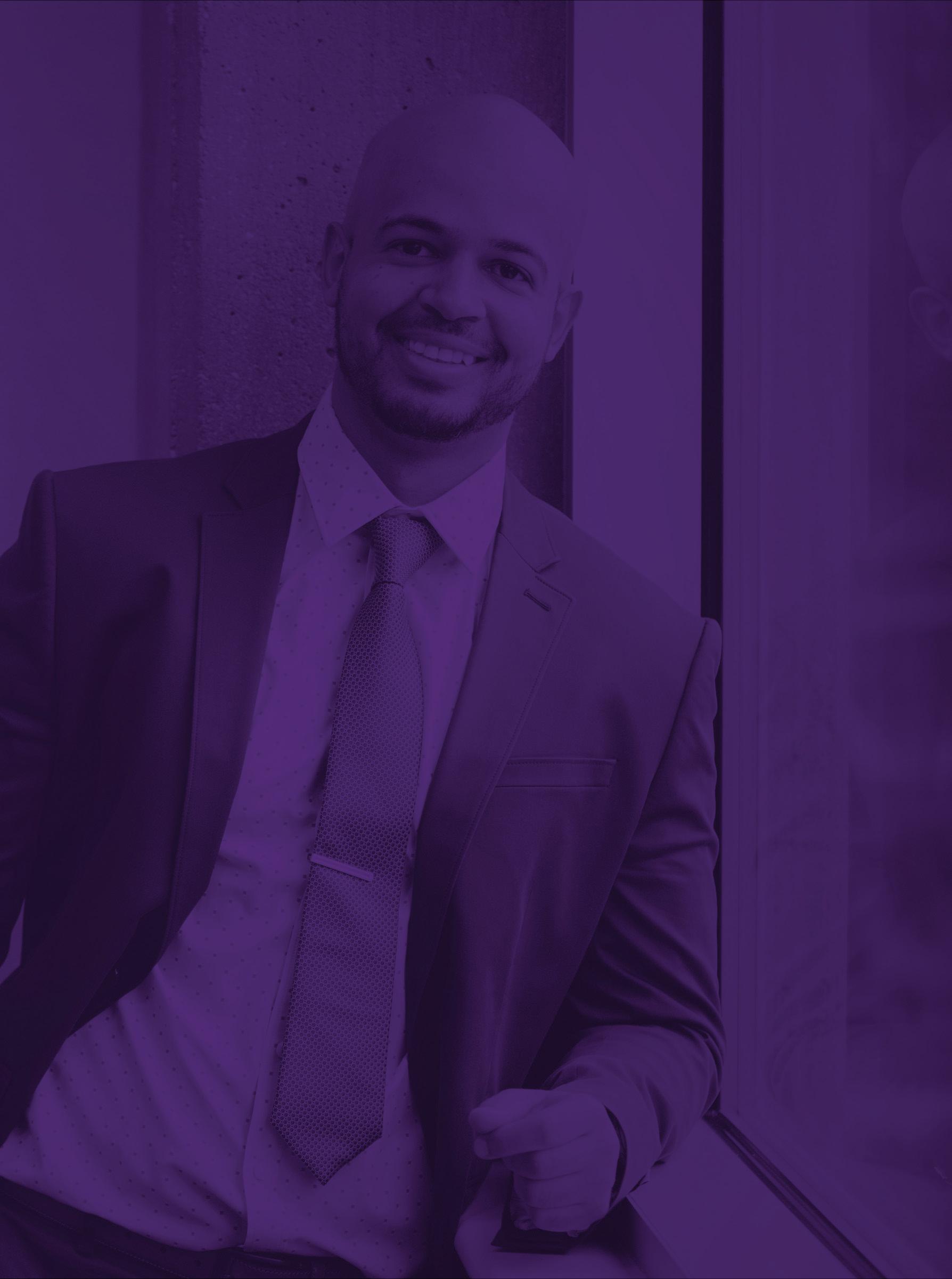 LESLIE K. WILSON
LESLIE K. WILSON
MANAGING EDITOR
JORDAN MCNAMARA DESIGNER MEGAN GREEN WRITERS WRITEBRAIN KATIE KRIES
RUSSEL GUAY
NIKAYLA HOFFMAN
MOLLY WELLS
Please send comments, suggestions and ideas to: unibusiness.editor@uni.edu

UNIBiz is published annually by the University of Northern Iowa College of Business.


The University of Northern Iowa does not discriminate in employment or education. Visit uni.edu/ policies/1303 for additional information. ©2023 University of Northern Iowa College of Business

Many wonder whether they can do that through a major and career in business.

Remember the course, Legal and Social Environment of Business? In some form, this course has been part of our curriculum for over 40 years. Business does impact the world. That impact can be positive or negative, sometimes depending on your perspective. What is the level of social responsibility that businesses should assume? What metrics should drive business decisions?
There are those that question using profit as the sole measure of business success. Milton Friedman, economist and Nobel Prize winner, advanced the notion the business’s only social responsibility is to maximize shareholders’ profits. It is up to the shareholder to distribute those profits to the causes they want to support, not the firm.
Others now argue that focusing only on profit results in short-term decision-making creating longer-
term risks. Instead, the long-term success of the firm requires balancing the four P’s – people, planet, purpose and profit.
Along those lines, some investors are seeking to invest in companies that share the same social responsibility perspectives as their own – the people, planet, purpose trifecta. We see this in the rise of ESG reporting by public firms and ESG investing.
Beyond ESG reporting, businesses have responded to the push for purpose by articulating the greater good served through their products and services: Build tractors vs. feed the world. Sell insurance vs. protect families. Produce pharmaceuticals vs. help people live their best lives. As an employee benefit, more companies are providing paid time off for volunteer activities and matching their employees’ financial donations. Businesses are listening and responding.
Our role as a business college is to help provide insights into
the push and pull of the various perspectives for managing a firm from a people, planet, purpose and profit perspective. Our faculty do that through their research and integrate what is learned into the curriculum and experiences designed to ensure graduates are prepared for the challenges of today’s workforce.
I’d love to learn more about how your organization has responded to the call for business decision-making that recognizes metrics beyond profit.

leslie.wilson@uni.edu
linkedIn.com/in/UNIBizDean @LeslieWilsonUNI
Over the last several years, conversations with soon-to-be alumni and prospective students have shared a distinctive theme – they want to make a difference in the world.

For many years, the primary answer was to provide value – primarily financial – to stakeholders. While that’s still one of the main responsibilities today, the answer to that question has become much more nuanced over the past couple decades. That’s because of the rise of corporate social responsibility, a term that refers to the concept that a business should not only provide value to stakeholders, but also to the larger community in which it exists.
CSR comes in many forms. It could be a decarbonization goal to benefit the environment or equity initiatives within the company or its community. It could even be something as simple as volunteering or providing grants in the community. CSR has become a major part of the business matrix. In 2019, 90% of businesses listed on the S&P 500 produced a CSR report, up from just 20% in 2011.
According to a Harvard Business Review article, about 70% of Americans believe it’s either “somewhat” or “very important” for companies to make the world a better place.

The reasons for the upward CSR trend are nuanced, but largely attributed to a rising awareness around issues such as climate change, income inequality, unfair labor practices and much more. The internet and social media have made it much easier to access information and learn more about a company before buying products or working for them.
“CSR has grown tremendously within the U.S. partly because of the impetus for a greater push toward international CSR standards alignment, and partly because the trajectory of social media and high-tech growth during this period has enabled consumers to become more rapidly informed,” said Eric Lee, assistant professor of accounting.
Alicia Rosburg, assistant professor of economics, has a background in sustainability and CSR research. For her, CSR is an important part of doing business today, and it’s not something as simple as achieving a goal and moving on. Proper CSR is an integration with day-to-day business operations, something to consider with every business decision.

“CSR is something that is very dynamic and requires constant assessment,” she said. “It’s something to continually work at, because what is responsible environmentally and socially changes over time. We live in a dynamic world, and you have to constantly adjust to that.”
Rosburg points to Frontier CoOp in Norway, Iowa, as an example of doing CSR right. A natural spices and organic dried herbs company, Frontier Co-Op has goals focused on environmental stewardship and social giving, including a zero-waste initiative to divert 90% or more of its waste from landfills at each of its four Iowa locations. The business also commits 5% of its profit toward socially responsible spending, including grant programs, national organics research and community funding.
Companies like Frontier CoOp can make a big impact. Much of the money funneled into CSR programs stays within and benefits the community. For example, donating time or money to a local charity can help improve the standard of living in that community. Or making a concerted effort to preserve the environment has a positive long-term effect, which lends itself to long-term benefits for business.
The true financial value behind CSR is inconclusive, but many studies find that it does boost a company’s standing and draws in consumers who make purchasing decisions based on CSR records. There are some signs this is even more important with Generation Z, the group of people born between 1998 and 2010, as they enter the workforce.
“This generation is vocal about their want for things that are socially and environmentally responsible,” Rosburg said. “I’m excited to see what happens when this generation becomes more ingrained in the workforce. Are they going to be the generation that makes the shift and forces companies to be more socially responsible? Will they be willing to potentially pay more for a socially responsible product?
CSR is a big consideration for potential employees already. According to the Harvard Business Review, about 93% of employees believe companies must lead with purpose. And 95% of employees believe businesses should benefit all stakeholders – not just shareholders –
“CSR is something that is very dynamic and requires constant assessment. It’s something to continually work at, because what is responsible environmentally and socially changes over time. We live in a dynamic world, and you have to constantly adjust to that.”
Alicia Rosburg
99% of employees believe companies must lead with purpose.
95% of employees believe businesses should benefit all stakeholders, including employees, customers, suppliers and the communities they operate within.
including employees, customers, suppliers and the communities they operate within.
Skylar Mayberry-Mayes (Finance ‘12) has been looking at this topic with Generation Z and Generation Y in particular. When he began thinking about research topics for his doctoral dissertation, he wanted to explore the experiences of younger people and their attraction to employers. Throughout his research, he has interviewed many MBA graduates to better understand this phenomenon. He’s constantly learning that CSR is a huge consideration in employer attraction, sometimes even more important than a company’s benefits or pay structure.
“The traditional approaches of compensation aren’t necessarily the things that are attracting talent anymore,” MayberryMayes said. “Similar priorities have been expected for reputable organizations, corporate responsibility, and opportunities for continued learning and development.”
Research seems to back up that claim. Deloitte’s annual Gen Z and Millennial survey stated that “Prioritizing work/life balance, learning and development,
and well-being will be critical, as will having a clear purpose and giving employees the opportunity to address societal issues through their work.”
Mayberry-Mayes observed that sometimes companies involved with CSR programs still aren’t including it as part of the recruiting and application process. Simple additions can go a long way, like promoting the benefit of volunteer time off or listing CSR initiatives and accomplishments on the job posting itself.
CSR seems only destined to grow, and because of that, there’s a push for more standardization in CSR reporting. Right now, companies often publish their own reports, and there is the potential for cherry picked stats and examples. The end goals of consistent metrics are to hold businesses accountable to their CSR initiatives and also make records clear for purchasers.
“I want there to be some clarity to how businesses compare to others and reported in a way consumers can understand,” Rosburg said. “I do think there is a lot of gray around how to
interpret people’s actions and company’s decisions, but every year we get more information. We get more of an understanding of what we mean when we say CSR and what consumers want. So, I’m looking forward to CSR being more broadly accepted and how we interpret what that means.”
In the accounting industry particularly, Lee has seen a plethora of job opportunities in high-demand areas such as CSR, whether that’s environmental cost accounting and risk management, green taxation, or sustainability reporting and assurance. If these opportunities are any indication of where CSR could go, the prospects are bright, and CSR looks to be squarely in the mainstream for years to come.
“From both societal and educational standpoints, we are certainly on the cusp of a CSR revolution,” Lee said. “As stakeholders become more educated in CSR matters, companies worldwide have also responded by making a concerted effort to do well by doing good.”
Lee added: “All told, students who are considering these areas of specialization will likely be working in the forefront of business innovations for years to come.” BIZ
How can businesses better engage and retain employees? How can they boost productivity while providing fulfilling job experiences? These are ageold questions leaders face, and one unique solution some have turned to is giving employees a direct stake in the company through Employee Stock Ownership Plans, or ESOPs.
ESOPs allow employees to directly buy a stake in the company. There are more than 7,000 ESOPs in the United States, representing more than 14 million employees and more than $1.4 trillion in assets, according to a 2019 survey from Deloitte.
Some of the benefits of ESOP structures include increased productivity, salaries and job security. According to the National Center for Employee Ownership, employee owners are four times less likely to be laid off during economic downturns. They also earn 5%-12% more than conventional companies. Other benefits are less obvious, like a sharp rise in company growth. Deloitte
reported a 25% greater job increase over a 10-year period compared to similar companies.
“There are plenty of intangible effects, like a feeling of job security or belonging, feeling more affiliated with the company,” said Russell Guay, associate professor of management. “Employees feel like an actual piece of the company, not just a number. From a motivation standpoint, it’s certainly easier to motivate people and easier to reward them through ownership. If I perform better, then the company performs better.”
Stellar Industries, a Garnerbased work truck, trailer and accessory manufacturer, recently made the full transition to an ESOP after gradually moving
that way for more than two decades. Dave Zrostlik (Marketing ‘80), whose father helped start the company and is now the president, said the transition “was not a simple process.” There were significant costs to work with a knowledgeable consulting team and buy out past investors. But in the end, it was a process worth doing, he said.
In 2000, when part of the company was first opened to employee purchase, Stellar Industries shares were worth about $1. Today, those shares are worth more than $80. Zrostlik estimates about 50 people own more than a million dollars in company stock – life-changing wealth. He hopes that number continues to grow among the company’s more than 700 employees as new and prospective team members learn about the plan.
“It’s really what motivates me and so many others to keep coming to work every day and keep growing the company,” Zrostlik said. “We can benefit our employees that are loyal to the company
“Employees feel like an actual piece of the company, not just a number.”
for years while also benefiting our rural Iowa communities. We have many people who grew up here in north Iowa working for us, and they’re hopefully going to be set for retirement because of the wealth the company has provided for them.”

Mike Schreurs (Marketing ‘69) had a similar positive experience with Strategic America, a Des Moines-based marketing company. About four years ago, the company started to move toward an ESOP because Schreurs, the company chairman, and his brother were approached by another company about acquisition. They realized they didn’t want to feed into a larger organization. They wanted to retain the culture they worked to build and provide a unique opportunity for employees while also having an exit strategy to retire themselves.
The transition is still a work in process, and Schreurs mentioned it has been costly, particularly for a small business with around 135 employees. Schreurs said some younger employees are
still learning about the benefits of ESOPs, but he has noticed many taking more care of their work and expenses. “That’s a value we are seeing more and more, that they have a personal stake,” he said.
When first researching ESOPs, Schreurs reached out to a company in an adjacent space that operated an ESOP of their own. The company shared they helped make 142 employees millionaires over 25 years. That’s Schreurs long-term hope for Strategic America.

“We’ve got great benefits and competitive salaries, and yet to come into consideration is the value of this stock, and we expect it to grow,” Schreurs said. “Our hope is that in the next 20 years or so, employees are going to be glad they bought in.”
Schreurs added, “Companies want to survive and thrive whatever the season is, and they want to be part of something bigger to gain long-term significance. I think an ESOP is clearly one of the best ways to do that.” BIZ
DAVE ZROSTLIK Marketing ‘80 MIKE SCHREURS Marketing ‘69



Investment decision-making has long revolved around two key factors: returns and profits. But during the past couple of decades, additional factors have begun to influence those decisions. Due to the rise of environmental, social and governance (ESG) investing, many now use a socially-conscious set of guidelines to pick potential investments.
ESG investing has solidly entered the mainstream in the past several years, leading companies to adjust their financial reports and long-term goals to reflect the company’s desired impact on the environment and society. According to a 2022 study published by the Harvard Law School of Corporate Governance, about 28% of investors surveyed considered ESG “central to their investment approach” — up from 26% the year before. Bloomberg Intelligence reported that ESG spending may surpass $41 trillion in assets by 2022 and $50 trillion by 2025, one-third of the projected total assets under management globally.

ESG investing is big business, but what exactly is it? You may recognize it as corporate goals around the environment and society, such as decarbonization, employee benefits, or improvements to diversity, equity and inclusion. The ultimate goal of ESG investors is to encourage companies to drive initiatives that benefit society, in addition to the bottom line.

“I remember making our first investment in renewable energy in 1982, but it’s just become much more relevant now,” said Mick Kane (Accounting ‘91), a partner at Deloitte. He leads the firm’s global sustainability practice for tax. “In the past few years, we’ve invested heavily in this space, and we see it as a major initiative going forward. It’s important to more investors and our clients, and we want to make sure that we’re there to help serve them.”
The key to ESG investing is holding companies accountable for their long-term environmental and societal goals. And that’s important, Kane explains, because it provides these companies with tangible drivers behind efforts meant to benefit society. Kane spends a lot of his time with companies that have specific goals, like becoming carbon-neutral by a certain date. These commitments require significant
financial investments — decisions that may have been dismissed if not heavily pushed by investors and customers.
“Investors really bring it home because companies are looking for that return on investment, even if it may hinder their operational results. And companies do this for good reason, to benefit stakeholders and their returns,” Kane said. “At the end of the day, companies have to accomplish these publicly stated goals because they don’t want to be left in the dust by other companies. And customers and investors won’t want to do business with them.”
Companies around the world are taking notice and taking steps to publicize their progress. According to research from McKinsey, more than 90% of organizations on the S&P 500 publish ESG reports, as do about 70% of companies on the Russell 1000 index. The main driver has historically been an environmental component, like decarbonization, reducing water usage and more, but other parts of the
equation have become more prominent. In 2021, McKinsey discovered that proposals related to social issues increased by 37% compared to the previous year.
ESG examples have made big headlines in recent years. When Russia invaded Ukraine in early 2022, companies around the world pulled business from the country in protest. After the George Floyd protests in 2020, there was a larger focus on diversity, equity and inclusion among corporate leadership and the workforce.
“Investors want to find good companies, sustainable companies to invest in,” said Lei Wang, assistant professor of accounting, who has conducted multiple studies around ESG investing.
“ESG performance is a good indicator of a healthy company, and it helps investors make decisions. My research has shown that the disclosure of ESG information can increase investor confidence in firms and the market. The benefits are there for everyone — society, companies and investors — if it’s done properly.”

“In the United States, nothing is mandatory, but some things do feel mandatory because investors demand it. Things like the Carbon Disclosure Project or United Nation’s Principals for Responsible Investment,”
Madeline O’Donnell
ESG investing does come with potential limitations around profitability and accurate reporting. Many ESG goals can be tough to quantify, and there’s a lack of standardized reporting. For example, hiring a more diverse workforce could be defined in many different ways. What qualifies as diverse? How will these hires have the most impact? How do you report progress?
Ryan Flugum, assistant professor of finance, has researched ESG and its effect on long-term profitability. Reviewing company earning calls, he and his team found that ESG can be used as a talking point to cover for financial losses or other negative trends. A key solution would be to implement standardized reporting for major companies.
“It’s so hard to actually see if companies are following through on these stakeholder initiatives,” Flugum said. “CEOs seem to realize this, and so they adopt this positive ESG narrative, when they aren’t necessarily performing well in traditional shareholder metrics. So, you’ll have firms who share this positive message, even if they miss earnings, but they’ll drop that message if they met earnings. Sometimes it can seem like lip service, rather than delivering results for stakeholders.”
Changes seem to be on the way. In 2022, the European Union passed legislation requiring all large companies to standardize and “disclose information on their risks and opportunities arising from social and environmental issues, and on the impacts of their activities on people and the environment.”
The U.S. Securities Exchange
Commission is also in support of improving disclosures for ESG investing. These efforts seem to complement databases maintained by various entities, such as ESCI’s or Bloomberg’s ESG ratings.
“In the United States, nothing is mandatory, but some things do feel mandatory because investors demand it. Things like the Carbon Disclosure Project or United Nation’s Principals for Responsible Investment,” said Madeline O’Donnell (Finance, Real Estate, Spanish ‘17), commercial real estate ESG analyst for Principal Asset Management in Des Moines. “Those are already mandatory for us at Principal and those in Europe, and I think more ESG investors will be aligned on what should be and is being reported.”
Just like measurability, longterm profitability can be hard to quantify because large-scale adaptation of ESG is a relatively recent development. Accounting firm PwC found that 60% of ESG investors have reported higher performance yields, compared to non-ESG equivalents.
Despite this report by PwC, data has been mixed as to whether ESG investing provides a sufficiently secure way of maximizing investment returns. “I don’t believe there is enough evidence at this point to suggest that these types of policies are worthwhile,” Flugam concludes.
ESG investing doesn’t seem to be disappearing any time soon. Despite mixed evidence that ESG investing leads to higher returns for stockholders, Bloomberg reports that 41% of global business leaders surveyed
expect sustainable investments to increase by at least 20% over the next five years. 71% of those leaders say eventually no investment decisions will be made without considering ESG.
Government regulations will impact company ESG goals as well. More countries are moving toward greener policies, which heavily influences the environmental part of the ESG equation. Conversations around climate change have only exacerbated these efforts.
On the other hand, there is pushback against investment decisions dominated by ESG. Some state and local governments expect that state and pension investment decisions be driven by the fiduciary responsibility to maximize returns for shareholders alone and not take into consideration ESG goals.
Kane believes as younger investors, which are typically more socially and environmentally conscious, enter the market, ESG will be one of their biggest priorities and potentially be willing to accept lower returns as long as those investments represent their values. That could lead to a bigger ESG effort for years to come.
“Companies are taking position today in order to make sure they’re aligned to where they think the future will be,” Kane said. “And they see the importance of ESG with their customers, their boards, their employees, and particularly their investors, I just don’t see that dropping off going forward.” BIZ
Think of the fond places you frequent in your hometown. Maybe it’s the corner pizza shop, the downtown grocery store, or the bank next door. In many towns, these businesses are essential, employing community members and providing the only goods and services available for miles.

Small businesses are often referred to as the backbone of Iowa and the United States for a variety of reasons. In Iowa, small businesses make up about 99.3% of all businesses and employ approximately 50% of the state’s workforce, as reported by the U.S. Small Business Association in 2021. Additionally, small businesses play a significant role in driving Iowa’s economy, accounting for 81.7% of the firms that exported goods from the state in 2019, according to a report by the U.S. Census Bureau. On a national level, there are 32.5 million small businesses in the United States, representing 99.9% of all businesses in the country.
Beyond the numbers, small businesses also have many intangible effects, as they are often intricately interwoven into the community fabric.
“Small businesses give us our quality of life,” said Amy Dutton, director of the UNI Small Business Development Center.
“When you go to a community, and it doesn’t matter if it’s small or large, you’ll probably have your big-name box stores nearby. But the personality of those communities comes from those small businesses and the vision and effort of small business owners. It’s what helps us chose the places we visit, the places we want to live, how we tackle our day-to-day experiences.”
UNI graduates Emiliano (Communication Studies ‘04) and Shannon (Finance ‘03) Lerda have experienced this firsthand. Through their own small business, Elevate, they work with other small businesses. Elevate leverages a concept
called co-warehousing. Similar to co-working, co-warehousing provides space, shipping and logistics support for businesses. Since launching in November 2022 in Omaha, Nebraska, Elevate is at 40% capacity and employs 10 people. Shannon and Emiliano have plans to expand to other major cities as well to see if this concept can help other small business thrive.
“We feel small businesses are really, really important because a lot of the money they make stays in the community,” Shannon said. “We want to foster economic prosperity and growth for small business owners and communities. Yes, we provide shipping and logistics support, but that’s just the what we do. This is why we do what we do.”
One of their tenants, a tech organization called Motherboard, has already expanded to a second space and makes a direct impact beyond sales, employing people on the autism spectrum. “This
Small businesses make up about 99.3% of all businesses in Iowa.
Small businesses employ about 50% of Iowa’s workforce.

Small businesses account for about 81.7% of Iowa’s exported goods.
is more than just an economic difference,” Shannon said.
Emiliano agreed, and added that small businesses also help drive innovation.

“A lot of the greatest innovations that we will see in our lifetime come from small businesses,” he said. “It may be a mixture of tech businesses with other services, like businesses with physical goods, but I believe that small businesses are likely to be the ones innovating in our future. Supporting this innovation can help us all as a community.”
Along with the visible, quantifiable benefits small businesses bring to communities, there

are the small things that you can’t quantify. Small businesses sponsor the local little league baseball team. They make meaningful donations to community members in need. They provide valuable funding for school or library programs. And it’s those little things that perhaps mean the most.
“It’s hard to measure, because so many things are not tangible,” Dutton said. “Those are huge benefits, and that’s why I love working with small businesses. They can and often want to help their communities in so many ways.” BIZ
“We feel small businesses are really, really important because a lot of the money they make stays in the community,”
FURTHERING EDUCATION
PAID VACATION
SOCIAL CORPORATE RESPONSIBILITY

PARENTAL LEAVE
HEALTH INSURANCE














FLEXIBILITY

On-site acupuncture, yoga classes? Lunches made by chefs?! While these are some of the headline-grabbing employee benefits and perks offered out there — typically by top tech firms in Silicon Valley — a comprehensive and forward-looking benefits package does make a significant impact in recruiting and retaining top talent.

According to the Glassdoor Employment Confidence Survey, about 60% of people report that benefits and perks are a major factor in considering whether to accept a job offer. The survey also found that 80% would take additional benefits over a pay raise. Forward-looking benefits create loyalty and improve the lives of employees. According to Indeed.com, benefits “can improve your or your team members’ health and quality of life.”













“Benefits support employees in their lives outside of the workplace,” said Amanda Young (Management ‘01), chief human resources officer at Bankers Trust. “They also create a genuine connection on how employees view their employer and how their employer takes care of them. How do we take care of people? Benefits provide that support and make it easier for our employees to focus their energy at work.”

are changing,
Coming out of the height of the pandemic, companies around the country have reevaluated what their benefits packages look like as the fight for top talent increases.
Bankers Trust, Iowa’s largest privately owned bank, recently overhauled its benefits package to offer a more individualized approach to more than 600 employees. In addition to standard offerings like PTO (paid-time-off) and 401Ks, the company transformed its fitness reimbursement program into “Lifestyle Accounts.” Not only did Bankers Trust raise the reimbursement amount, but it also included items representing different parts of wellness.
“We’ve used this as a more holistic approach to wellness,” Young said. Examples include tuition reimbursements, dog park memberships, nonmedical counseling and more. “We really tried to expand that benefit that already existed and give it a larger amount, then evenly divide it within our organization. We’re giving more to employees that were in lower pay grade levels.”
The company doesn’t have exact numbers because the offering is still relatively new, but Young said the usage rate for the
program has increased. Bankers Trust also offers matching programs for charitable giving and volunteer time off. Thanks to employee engagement surveys, Young said many of these programs have been improved over the years as well, directly responding to feedback.
“I think these benefits really do reduce stress. They support our employee’s lives outside of the workplace,” Young said. “They create a more genuine connection on how employees view their employer... Benefits have changed over the last several years. I really think when we get down to it, employees want us to know that they are unique individuals.”
Alliant Energy, a major utility provider in Wisconsin and Iowa, recently pivoted toward a more holistic wellness approach with its benefits as well. In May 2023, the company began offering a mental health and well-being benefit, offering up to six free therapy sessions per year for employees and their family members covered by medical benefits. Employees are also offered a personalized care navigator who can help them find doctors, appointments, medication coaching and more.
“It’s been very well received by employees in our organization,”
said Diane Cooke (Accounting ‘01), vice president of human resources at Alliant Energy. “Our purpose as a company is to serve customers and build stronger communities. So, you think about that, and the only way we can do that is by having highly engaged and valued employees in our organizations.”
Alliant Energy has more than 3,100 employees. The company believes that benefits focusing on mental health, as well as traditional benefits such as competitive health insurance and retirement benefits, contribute to better employee engagement and productivity.
“We certainly think that these types of benefits help power people’s lives in and outside of work,” Cooke said. “When you focus on well-being, that means you’re well rested, you feel safer, and you’re probably going to be more mindful, present and innovative. I think these all really factor in the work-life balance.”
Alliant Energy and Bankers Trust are part of a larger trend around well-being benefits. During the height of the COVID-19 pandemic, mental health issues skyrocketed. In 2021, nearly half of Americans
“I think these benefits really do reduce stress. They support our employee’s lives outside of the workplace. They create a more genuine connection on how employees view their employer... Benefits have changed over the last several years. I really think when we get down to it, employees want us to know that they are unique individuals.”
Amanda Young
reported recent symptoms of anxiety or depression and 10% said their mental health needs were not being met. In the workplace, a U.S. Surgeon General survey found that 76% of employees reported at least one mental health condition. About 81% of employees said they will be looking for workplaces that support mental health in the future.
It seems that companies have answered in recent years. According to Glassdoor, 63% of companies surveyed in 2022 offered benefits for mental health, compared to 45% in 2017.
Atul Mitra, professor and head of management at the UNI College of Business, focuses his research on the management of compensation practices, including salaries and benefits. A trend he noticed coming out of the height of the pandemic was the blurring of work and life, which has likely contributed to these numbers and the beneficial push toward supporting mental health in the workplace. There’s also a shift in workplace demographics, as the early part of Generation Z starts to join the workforce.
“Beyond the pandemic, I think there’s a new generation that wants more mental health and well-being, which has helped it emerge as a significant category of benefits within the last two or three years,” Mitra said. “Within that, there are some interesting offerings. Expanding resource programs that offer free therapy sessions. Or even offering pet insurance to encourage employees to get pets, which has shown to improve mental health.”
Other examples include fitness membership reimbursements, flexible work hours and arrangements, caregiver leave, meditation apps or even a dog-friendly office.
At Principal Financial Group, where Skylar Mayberry-Mayes (Finance ‘12) works as a Senior Strategist with Principal Foundation and community relations, there are a host of unique and innovative benefits, including (unlimited) Flexible Time Off, an employee stock purchase plan, tuition assistance, a volunteer & match giving program and much more. And, according to MayberryMayes’ PhD research studies, some of the most desired benefits for younger employees are how a company encourages and promotes Corporate Social Responsibility (CSR), as well as fostering a culture of continued learning.
“I do agree that a lot of traditional benefits like flexible work schedules and paid time off, are extremely important for employees,” Mayberry-Mayes said. “But equally compelling is what a company does socially, and how they show up as a good corporate citizen within their communities.”
Company programs focused on volunteerism, charitable giving, and employee engagement can go a long way in building brand affinity and employee retention. According to the Society for Human Resources Management, 46% of Generation Z and 55% of Millennials say CSR is important. Those two demographics will make up about 72% of the workforce by 2029.
“Mentioning that there’s volunteer time off and other charitable benefits to employees is very important, in addition to featuring the good that a company does within their community” Mayberry-Mayes said. “It’s not as common that you see CSR
aligned benefits being listed in job postings, but it makes a difference in what attracts younger talent nowadays.”
Just like they have for the past two decades, benefits and perks will continue changing as these younger generations make their voices heard. On the business side, one of the biggest benefit costs is health insurance, and prices continue to rise. Young believes that will lead more companies to look for more individualized, al-la-carte perks like Bankers Trust’s “Lifestyle Accounts,” to offer benefits in other areas to remain competitive for a wide range of employees.
“I do think that if companies have limited resources, they’re going to look for opportunities that allow them to meet employees differently at different parts of their life,” Young said. “Benefits like the Lifestyle Accounts gives the employer and employee more flexibility and options because people are looking for a more individualized experience.”
Cooke agrees, adding that education around benefits is important. And as these employee perks continue to evolve, both employees and employers figure to benefit. Employees receive a more holistic approach, and employers enjoy a more engaged and healthier workforce.
“I think benefits will offer more optionality about how people live their lives and what they find valuable,” Cooke said. “During the pandemic, employees navigated a lot of political and social unrest. I think employees look to their employers to be that center of interest. So employees will continue to look to employers to continue to provide those options that meet their needs that continue to expand and change.” BIZ
UNI’s Advance Iowa is creating an Employee Ownership Center to advance the College’s mission to promote the economic vitality of Iowa communities. Across the U.S., small business closures have been identified as a potential crisis for rural and underserved populations. A 2022 Business Enterprise Institute (BEI) study found over 80% of business owners plan to exit in the next decade. Few of these businesses have a succession plan or plans to transfer ownership. If these businesses close, that could be especially devastating for rural families and economies. Every business closure means lost jobs and economic activity, but in a small community, this can also mean the loss of critical community resources or amenities.
As business owners approach retirement age, they might look first toward family or outside purchasers to take over the business. However, a growing number have turned to employee stock ownership plans (ESOP), which have emerged as a potential solution. Especially in rural areas where there may be few potential purchasers, employee ownership can be a win-win-win

solution. Transitioning business owners achieve their financial objectives and legacy goals, while the business’ employees have an opportunity to acquire ownership, and the community retains an important part of its economic ecosystem.
“Employee ownership works, regardless of the company size, because employees directly associate their vested interest with the company’s financial success.”
Advantages of employee ownership extend well beyond being a solution to save rural businesses. Employee and shared ownership is gaining momentum because the structures democratize business ownership benefits and improve financial results. According to a Rutgers University study, employee ownership can boost company productivity by 4%, shareholder returns by 2%, and profits by 14%. Paul Kinghorn, director of Advance Iowa, states, “Employee ownership works, regardless of the company size, because employees directly associate
their vested interest with the company’s financial success.”
The many company benefits that can come with employee ownership, including improved pay, benefits, wealth and job satisfaction, and a mechanism that provides a smooth and seamless transition of ownership offers long term benefits to Iowa’s rural communities with increased local spending, stable jobs and community wealth building.
UNI’s new Employee Ownership Center provides structures and resource networks to support the long-term success of employee and shared ownership models that fit a company’s unique needs and goals. Program services include support for worker cooperatives, employee stock ownership plans (ESOPs), employee ownership trusts and other shared options such as profit sharing and stock options.BIZ
Energy efficiency plays a crucial role by reducing the amount of energy consumed. For businesses like Bodensteiner Implement Company, this translates to a decrease in their environmental impact from energy generation and a substantial reduction in their energy costs.
Bodensteiner Implement Company is a family-owned corporation founded in 1982. The company operates 10 John Deere retail locations serving 12 neighboring counties in northeast Iowa.
In August 2022, they took advantage of the Iowa Waste Reduction Center’s (IWRC) Iowa Energy Efficiency Program for Rural Small Businesses. This program is designed to assist small businesses seeking to improve their bottom line by reducing energy consumption. For Bodensteiner, engagement in the process took a minimal amount of time.
Associate Director Dan Nickey scheduled assessments with facility managers at every location once the contact was established. The evaluation took only one to one-and-a-half hours, after a tour by the facility manager.
Three main areas were evaluated during a standard energy assessment: compressed air, lighting and building envelope. An ultrasonic leak detector is used to assess compressed air to
identify any leaks in the compressor or hoses. If a leak is discovered, it is tagged, numbered and size (in decibels) is noted. The lighting assessment determines if LED light bulbs are being used, and if not, projected savings are estimated based on switching to LED lighting. Lastly, the building envelope assessment involves using thermal imaging to detect energy loss in facilities that use heating and cooling systems, such as through unsealed doors or windows.
“Implement dealers are an ideal candidate for these free energy assessments,” says Nickey. “The evaluation doesn’t take long and more importantly, doesn’t require a large commitment from the facility’s manager.”
After the completion of the assessment, the results, recommendations and estimated cost savings were compiled into a report provided to Bodensteiner approximately three weeks post-assessment.
The audit evaluated 10 Bodensteiner Implement Co. locations with the aim of reducing energy costs. The assessment revealed that switching to LED lighting at two locations could save the company $2,325 annually.
During the compressed air assessment, Nickey identified and fixed 73 leaks, with the smallest costing $75 annually
and the largest costing a whopping $1,415 annually. By implementing all recommendations, including fixing the leaks and switching to LED lighting, Bodensteiner Implement Co. is projected to save $39,168 annually and reduce greenhouse gas emissions by 585,579 lbs of CO2, 981 lbs of NO, and 2,018 lbs of SO2. The company is pleased with the results and proud to contribute to protecting the environment while also saving money.
As the Bodensteiner Implement Co. example demonstrated, there can be substantial monetary benefits to contacting the IWRC to get an energy assessment for your Iowa small business. Thanks to a grant from the Iowa Energy Office, the assessment is conducted at no cost to businesses employing fewer than 100 people per facility in Iowa. The ultimate goal is to reduce Iowa’s energy consumption by making Iowa small businesses more energy efficient.
In the four years that the IWRC has been conducting free energy assessments, a small business has been able to see a 10% reduction in energy consumption resulting in an average savings of $3,400 per year. Bodensteiner Implement Co., now has the opportunity to save thousands in yearly energy costs. BIZ
Tony Simmons, former president and CEO of McIlhenny Company, showed up in Des Moines and “kicked it up a notch” at the second annual Iowa Family Business Conference presented by the University of Northern Iowa Family Business Center. The event featured a keynote address from Simmons about his time growing up in and leading McIlhenny Company. He might be from Avery Island, Louisiana, but his story focused on what we know all too well in Iowa: family businesses are different.

Only 30% of family-owned businesses survive the transition to the second generation. Moving leadership from a business founder to multiple siblings or cousins introduces challenges and complexity most families struggle with.

The Iowa Family Business Conference is designed to tackle a number of these challenges in a one-day event so families can learn, share and spend time with their family members away from the chaos of the normal work environment. The conference also provides an opportunity for families to connect and network with other families facing the same challenges and learn various ways to handle them (and in some cases, how NOT to handle them.)
Generational succession planning is one of those key challenges, if not the most important. Some transitions are well prepared while other times when plans have not yet been put
in place. Hearing from Iowa families about how they have navigated their generational leadership and ownership succession can be incredibly beneficial to others who are, or will be, managing the change. The struggle is real, as they say, in terms of one generation letting go and a new generation taking control.
In his keynote address, Simmons, a fifth-generation retired leader of the iconic Tabasco Pepper Sauce maker, identified how intentional his family has been to keep alive the story and legacy of the founder of their firm. When asked how a business survives to the fifth, sixth and seventh generations of ownership, he had such a simple yet powerful thought on that: you have to take care of the business, first and foremost. The family has to gather around the mantra, what is good for the business is good for the family.
Family businesses are the engine for Iowa’s rural and urban economies. Based on national statistics, they drive 78% of all new job creation and are responsible for almost 55% of GDP. In part because of their important positioning in the state economy, the UNI Family Business Center wants to help these families tackle tough challenges and help them stay sustainable.
Landon Geater (2011, Business Management), executive vice president of Geater Machining & Manufacturing in
Independence, IA, recognizes the importance of family businesses in the state. “Seeing the role that Geater plays as a family business in Independence and Iowa has been one of the biggest rewards. Contributing to people’s livelihood, supporting the Independence community, and supplying products that not only help other Iowa businesses but have an international impact is a proud feeling for my family and me,” said Geater.
Family businesses are a vital part of Iowa’s economy, driving job creation and contributing to GDP. However, these businesses face unique challenges, particularly in the area of generational succession planning. The Iowa Family Business Conference provides a valuable opportunity for families to learn from each other and tackle these challenges together. By prioritizing the needs of the business and fostering a culture of intentionality, family businesses can thrive for generations to come, benefitting not only themselves but their communities as well. BIZ
Family businesses play a vital role in Iowa’s
The year was 2017. The town was West Union, Iowa. At 13, Nathan Crooker (‘25, finance) was in middle school and too young to be employed but wanted to start earning money. With the help of his family, he bought a cotton candy machine and started selling his product at athletic events. Energized by this success, he got his foot in the door at the Fayette County Fair where everything changed.
During the county-wide event, Nathan and his twin brother, Davan, met the owner of a food truck called The Brain Freezer. Coincidentally, he was looking to sell. The next thing they knew, Nathan and Davan were negotiating a purchase price and going into business together. At age 14, they became owners of The Brain Freezer and operated it for the rest of the season. The shaved ice truck offered 30 flavors and three sizes of sweet treats. Nathan and Davan quickly learned the behind-the-scenes headaches of business ownership.

“The first event was a nightmare,” said Nathan. “But the second was during a homecoming event and we had a line for six hours straight. That was a great learning opportunity for managing procedures and working with customers.”
The Brain Freezer showed up at more events across northeast Iowa, and the brothers learned how to work together and manage a business. Then, in their second full season, the pandemic hit, and in-person events slowed down. Nathan bought out Davan’s half of the business, allowing each to focus on their own passions.
With high school classes happening infrequently and online, Davan (‘25, finance) started thinking about how he could merge his love of being outdoors with his need for cash. After hours of watching YouTube videos and consulting with mentors, DC Outdoor Services was born.

“My first project was leaf cleanup,” said Davan, “but that summer I got to bid my first job to install plants and mulch and redo part of a retaining wall. I hired my brother, dad and a friend and knocked it out in two days. After that, I got mulch jobs and started getting medium-sized projects.”
After the success of that first year, Davan was able to purchase a dump trailer, skidsteer and truck, which expanded the capacity of projects and services he could provide. Now, DC Outdoor Services specializes in design-build projects like patios and retaining walls, and they also offer grading and plant installation.
Despite their different business types, the brothers shared a strong entrepreneurial spirit and often supported each other. It was soon time to make a college decision. Davan and Nathan asked themselves where they could go to get a quality education and grow their ventures. The answer? The University of Northern Iowa.
“We heard good things about the business program and decided to attend a business visit day,” said Davan. “We liked that the department heads were present-
ing and engaging with us. One of the breakout sessions was marketing and entrepreneurship, and Bart Schmitz, program manager at the John Pappajohn Entrepreneurial Center (JPEC) asked if anyone had a business. I raised my hand and we ended up going to lunch to talk more.”
The UNI John Pappajohn
Entrepreneurial Center offered both Davan and Nathan office space and support to continue their businesses out of the JPEC’s R.J. McElroy Student Business Incubator.
“The JPEC has helped me go from one trailer to two!” said Nathan. “The JPEC’s been huge for giving me a growth mindset and focusing on what the next steps are, how to expand, and how to meet varying needs. I have four employees, and we’ll be able to hit more events in a larger market because of the systems and support we have.”
Davan and Nathan continue to live out their entrepreneurial journey with support from the UNI JPEC. Learn more about the JPEC’s offerings for student and community entrepreneurs at jpec.uni.edu. BIZ






















































































In 1970, Milton Friedman stated that the social responsibility of business is to focus only on increasing its profits. In the mid-1990s, John Elkington advanced the triple bottom line for businesses – people, planet and profit in an attempt to put social responsibility and the environment on an even level with shareholder profits. Many years later, where does the business world stand today?
While we often think primarily of shareholders, people refers to all relevant stakeholders such as employees, shareholders, customers, suppliers, community members, as well as future generations. Each of these stakeholders can be impacted significantly. For example, employees alone should be able to expect good working conditions, employers who understand the value they provide, fair policies, as well as hiring practices that promote diversity, equity and inclusion at all levels of the organization.
This could include any environmental impacts such as new facilities, sustainable environmental policies and practices, reducing waste, environmentally conscious supply chain operations, as well as limiting harmful emissions, usage of natural resources, and impacts on climate change to leave the planet in a better place.
The most common thought here is the financial profit of the organization itself, but we also need to consider positive and negative impact on local, national or global economies (for example,
the negative economic impact of child labor or unsafe work conditions or the positive economic impact of developing good jobs, generating innovation or paying taxes).
While those three “P” words all still seem appropriate, is there anything missing? Many people have argued that we need to put more attention on a fourth “P” word – Purpose. In my mind, Purpose could include any of the following:
• Ethical decision making and values-driven leadership focused on making a more sustainable impact on society via positive change initiatives.
• More focus on the environment, creating jobs and fostering innovation.
• Long-term value creation sparked by a meaningful vision for the future that allows organization to still be profitable in achieving that vision while also focusing on all stakeholders and the environment as well.
• Collaboration among all stakeholders via cross-disciplinary teamwork and effective measurement of results.
None of this is easy but we know it is worth it. Corporate social responsibility is very good for business in terms of attracting new customers and retaining existing customers. It also helps significantly to recruit millennials and Gen Z employees who often seek companies that strive to make a difference such as providing time off work to volunteer in their communities.
BIZ
RUSSELL P. GUAY, PhDAssociate Professor of Management,
 David W. Wilson Chair in Business Ethics
David W. Wilson Chair in Business Ethics


Former students, alumni, peers, and community members, I would love to hear your thoughts. Please feel free to reach out anytime on LinkedIn or via email (russell.guay@uni.edu).
The views and opinions expressed are those of the author and do not imply endorsement by the University of Northern Iowa.
On Saturday, April 22, the world lost John Pappajohn — an entrepreneur, visionary, philanthropist and so much more. In his 94 years, Pappajohn and his wife Mary left a legacy that will remain unmatched in the entrepreneurial community for years to come. The University of Northern Iowa is fortunate to be a benefactor of his lifelong philanthropic efforts, particularly with the UNI John Pappajohn Entrepreneurial Center, and remembers the legacy he leaves on UNI faculty, staff, students and community members.
“When I started my career at UNI in 2007, I did not realize the lasting impact that John Pappajohn would have on the lives of the students that I served at the JPEC,” said Laurie Watje, director of the JPEC. “His vision of entrepreneurship and how it could change the economy of Iowa was truly visionary. He generously donated millions of
dollars to support UNI’s John Pappajohn Entrepreneurial Center and allowed our center the flexibility and freedom to create programs and services that were relevant to our students. The creation of the network of five Pappajohn Centers throughout the State of Iowa who worked together on state-wide competitions and programs became a model that other states envied. Without John’s foresight, numerous businesses in the Cedar Valley and the State of Iowa would not be in existence today.” At the University of Northern Iowa, one of the main impacts on students is the opportunity to gain hands-on experience in entrepreneurship. For years, Pappajohn’s philanthropy has fueled a variety of programs that allow students to develop and launch their own businesses. These programs, such as the R. J. McElroy Student Business

The University of Northern Iowa remembers the life and legacy of John Pappajohn
Incubator and Early Founders Program can be invaluable for students who are just starting out and may not have the expertise or resources needed to navigate the complexities of entrepreneurship.

“My time at JPEC has been life-changing,” said Nathan Crooker (Finance, ‘26). “So many opportunities have become available for me because of my involvement with the center. One of these includes competing in the 2023 Pappajohn Student Entrepreneurial Venture Competition, which provides an opportunity to pitch for up to $5,000 of capital funds. I am honored and grateful for the opportunity to participate in such a meaningful and impactful competition created by John Pappajohn. This is just one example of the many ways he has enabled student entrepreneurs to succeed with their ventures.”
Students like Nathan have relied on seed capital funds to turn his dream of owning The Brain Freezer, a shaved ice truck, into a reality. Overall, John Pappajohn’s funding has played a significant role in promoting
student entrepreneurship. His contributions have helped to create a supportive environment for student entrepreneurs and have provided them with the resources, mentorship, and funding needed to succeed.


“I was able to achieve my entrepreneurial goals because of the foundation I received from JPEC,” said Russel Karim (Computer Science ‘15), the founder and chief executive officer of Dhakai, a Des Moinesbased technology company and marketplace that helps connect small- to mid-sized clothing brands in the U.S. with ethical and sustainable South Asian manufacturers. “I started, failed and succeeded in multiple ventures during my time at JPEC. We were challenged and supported with valuable resources every day to build our strong entrepreneurial muscles. I am extremely grateful to the JPEC and to John Pappajohn for his generosity to change the trajectory of the Iowa entrepreneurial community.”
With mentoring programs and individualized support services, the UNI JPEC is able to reach outside of UNI to support entre -
preneurs and small business owners in the greater Cedar Valley community, and helped launch 98 businesses in fiscal year 2022.

“John Pappajohn left a remarkable legacy to the citizens of Iowa,” said UNI President Mark Nook. “The University of Northern Iowa John Pappajohn Entrepreneurial Center stands as a lasting testament to not only John’s generosity, but also his entrepreneurial spirit that positively impacted the lives of so many in our state. Of course, UNI was one of several campuses across Iowa whose students continue to benefit from John and Mary’s commitment to entrepreneurship.”
“I never in my dreams thought I would someday be the director of the JPEC, have the privilege of working with hundreds of student entrepreneurs and teach hundreds more in the classroom, and it is because of John’s belief in the power of individuals creating positive change in the world,” said Watje.
“I am grateful for John’s positive mental attitude and mantra of ‘If I can do it, you can do it.’ His legacy and contributions to entrepreneurship, education and philanthropy will be remembered for many years to come.” BIZ


It is with great pleasure that we welcome the graduating classes of summer 2021 through the summer of 2022 to the business college alumni family.
ACCOUNTING
Dylan Baker
Tyler Banker
Matthew Beerman
Nathan Blocker
Alek Boeding
Jordan Boekelman
Sydney Boevers
Madison Bower
Chelsea Burrows
Emily Colwell
Brenna Crinigan
Kacey Croghan
Allison Crump
Hannah Dash
Luke Delap
Amber Des Jardins
Thomas Digmann
Emily Donaker
Harrison Driscoll
Connor Dunsbergen
Carson Ehrenberg
Lauryn Embleton
Katelin Emehiser
Benjamin Flanagan
Blake Frederick
Nathan Funke
Vanessa Gauger
Bradley Gregory
Elijah Griffioen
John Guerrero
Jenna Haugen
Jenna Hauschild
Alexis Hayes
Morgan Hearden
Hannah Himrod
Andrew Hingst
Rebecca Hinz
Jason Huang
Ryan Keck
Ethan Kempema
Derek Koppes
Lucas Kremer
Derek LaBarge
Erik Lackore
Mark Leifker
Kara Lindhoff
Adam McKown
Nathan Mentzer
Nicholas Mortoza
Jesse Nicholson
Olivia Nord
Cameron O’Donnell
Carissa Oolman
Cassidy Pearson
Dawson Peters
ZeAnna Phillips
Taylor Promes
Yangyang Qin
Lauren Resewehr
Trae Rogers
Gage Schmidt
Mingsong Shen
Brianna Smith
Rhiannon Smuck
Brenden Suhr
Gavin Sullivan
Logan Swaim
Brian Thome
Cade Tindall
Marcy Uglum
Connor Van Pelt
Alyssa Wade
Paige Walker
Hunter White
Mason Wirtz
Jordan Wolfe
Xiaotao Zhou
BUSINESS
TEACHING
Emily Burk
Sarah Garland
Rachel Greene
Mary Hayes
Laurel Keenan
Russell Kruse
Brady Miller
Michael Rimathe
ECONOMICS
Shreeti Adhikari
Kamal Al-Dheeb
Jason Becker
Matthew Beerman
Jeffrey Bryk
Chelsea Burrows
Nicholas Coloff
Kobe Diers
Madison Eberhart
AnnaVay Ellingworth
Jenae Frisch
Abbie Ruggeberg
Claire Schafer
Ben Schlegel
Dannielle Schmitt
Yifei Shen
Chase Sinclair
Jacob Sly
Jackson Smith
Anthony Smith
Benjamin Spence
Kyle Sperfslage
Mallory Steege
Landon Steffen
Alec Steffes
Brandon Stenger
Matthew Stewart
Thomas Storbeck
Abigail Tentinger
Rose Thai Sitong Tian
Paul Toczylowski
Mitchell Vercautren
Molly Visokey
Jordan Von Arb
Paige Walker
Mingfei Wang
Joshua Wason
Nicholas Weber
Samuel Webster
Jiejie Wen
Tristan Wessels
Lynsey Winters
Logan Wolf
Jordan Wolfe
Shichen Zong
MANAGEMENT
INFORMATION
SYSTEMS
Dylan Baker
Kaleb Bolte
Hannah Bormann
Madison Bower
Payton Bucher
Avery Buseman
Zachary Buzynski
Travis Carriger
Kacey Croghan
Allison Doyle
Madison Eberhart
Nicholas Fonza
Katelyn Gerdes
Bradley Gregory
Dylan Harris
Jenna Haugen
Malik Haynes
McGwire Hill
Macy Hoeger
Noah Hogge
Isabelle Holtzen
Jason Huang
Jaeda Isley
Ryan Keck
Jaden Kuethe
Mitchell McCauley
Steele McKinnon
Andrew Menke
Nicholas Mortoza
Ngonyo Njenga
Justin Nussbaum
Curtis Patterson
Reagan Ries
Gage Schmidt
Hunter Storms
Logan Swaim
Cataldo
Yijing Chen
Ethan Clark
Kelli Crandall
Carlee Cuthbert
Jacob Davis
Adam Fraher
Manuel Garcia
Seb Gearhart
Edward Goodell
Brendan Gould
Tyler Grall
Jacob Grinstead
Connor Grunwald
Kaleb Haner
Anna Herrig
Tate Hookham
Zachary Hull
Carrinton Hunt
Beini Jin
Blake Jones
Emma Kaisand
Denver Kammerude
Trevor Kluesner
Bailey Knowlton
Vanessa Kolb
Karla Krueger
Jaden Kuethe
Tara Linden
Leah Little
Claire McDonough
McKenna Meinhard
Brooke Metcalf
Guy Minert
Jacob Moews
Emma Mooers
Savannah Moyer
Megan Murphy
Austin Myli
Adam Nalley
Arabella Novitch
Abigail Olson
Alexandra Parker
Regann Pfeiler
Allison Ramm
Jeffrey Reicks
Jenna Richtsmeier
Jiayi Rong
Skylar Rueter
Paige Sandberg
Emily Schmidt
Kyle Schott
Lynn Schweer
James Slama
Dyllan Sparks
Jozie Sudmann
Yanghuan Tan
Ethan Tanner
LaVonne Tran
Madeline Trumm
Kelsey Van Aalsburg
Aleah Vaske
Sydney Volkenant
Brooke Vry
Shiyu Wang
Autumn Wedemeier
Elli Winter
Blair Wolinski
Chase Zielke
REAL ESTATE
Jonah Albertson
Kody Berns
Ally Besler
Nicholas Bjornsen
Connor Blough
Jordan Boekelman
Taylor Buchheit
John Burger
Kelsey Chalfant
Collyn Chipera
Grant Croat
Carlee Cuthbert
Benjamin Daumueller
Seth Deutmeyer
Andrea Echeverria
James Engler
Seth Gerber
Toby Giesemann
Tanner Haut
Michael Henter
Korbin Hoffmann
Haleigh Johnson
Addison Kalb
Ethan Kirby
Conner Krantz
Collin Kull
Tara Makepeace
Ryan Meyers
Kayla Micek
Brandon Mitchell
Jonathon Mootz
Devon Moran
Maggie Neyen
Jesse Nicholson
Scott Olberding
Eric Pingel
Tyler Potter
Chase Sinclair
Jacob Sly
Jackson Smith
Benjamin Spence
Alec Steffes
SUPPLY CHAIN MANAGEMENT
Amged Abdelrahim
Ryan Albaugh
Koby Alpers
Bashaka Audace
Bailey Bartels
Nick Bevans
Hunter Boldt
Hannah Bormann
Zachary Buzynski
Tyler Claussen
Austin Coyne
Dave Dejongoy
Trey Dugan
Jacob Eberle
Trevor Felton
Blake Frederick
Max Gardner
Katelyn Gerdes
Connor Grunwald
Haden Hall
Jacob Hildreth
Macy Hoeger
Spencer Huefner
Spencer Johnson
Blake Jones
Adam Kimball
Jacob Kuebler
Ya Liu
Ryan Lower
Drew Lubka
Andrew Menke
Alexandra Parker
Curtis Patterson
Allison Pecinovsky
Isidro Pena
Zachary Pregler
Marco Ramirez
Dylan Reiher
Taylor Reth
Rebecca Schmitt
Kyle Schott
Alex Schriever
Madison Schroeder
Kade Solverson
Amber Staudt
Jack Streicher
Kelsey Van Aalsburg
Sydney Volkenant
Jill Vonnahme
Seth Voss
Sayer Woodson
Courtney Zwart
MAcc
Brant Barnhart
Matthew Beerman
Joseph Belmonte
Anna Bjornstad
Amber Des Jardins
Emily Donaker
Evan Dosedel
Kaitlyn Evans
Morgan Fannon
Hunter Friesen
Vanessa Gauger
Matthew Guske
Alexis Hahn
Danika Harpenau
Heather Hoeger
Dmitriy Holthaus
Laura Kaufmann
Justin Kent
Matthew Langel
Brady Lorenz
Brady Lorenz
Gustav Muenzenmay
Nathan Mueterthies
Riley Takes
Marcy Uglum
Ryan Vogel
Cassandra Zinnel
MBA
Minmin Bi
Miranda Che
Yi-ju Chen
Beiyu Chen
Chen Chen
Juyan Chen
Shuli Chen
Xu Chen
Ye Chen
Wai Lun cheng
Yuk Ting Chung
Meihua Dai
Wentao Fan
Amanda Fesenmeyer
Liping Fu
Justin Garretson
Hillary Harting
Xuhao He
Youwei Hong
Rong Hu
Yilan Huang
Kar Chun Hui
Christine Kemp
Hon Keung Ko
Wan Yee Sandy Law
Na Lei
Yuen Bing Leung
Ke Li
Yuanyuan Li
Yuting Li
Zhongjie Li
Jinjin Lin
Xiaohui LIU
Chen Liu
Jing Liu
Jizhu Liu
Qiang Liu
Xiaojuan Liu
Xiaoshan Liu
Yingqun Liu
Zitian Liu
Pui Lam Lo
Sum Wai Lo
Lei Lou
Chung Man Ma
Megan Maahs
Klint Marler
Mohit Mehta
Xiao Meng
Yik Ka Ng
Yafang Niu
Jinhua Qu
Wenxin Qu
Yandi Shang
Yuanyuan SHEN
Baisheng Shen
Min Shen
Guofan Sheng
Jianjun Shi
Xingyu Si
Li Sun
Mahsa Tajnesaei
Wing Sum Tsai
Aili Wang
Haiying Wang
Xiangyun Wang
Zheng Wang
Junxia Wei
Chun Wing Wong
Chudong Wu
Hongjuan Xie
Yunzhao Xu
Shijia Yan
Yanjing Yang
Yunfeng Yao
Ziying Yao
Rosanna Yau
Yingfang Yu
Li Zeng
Lin Zhang
Mingming Zhang
Shikun Zhang
Xin Zhang
Yaping Zhang
Yinping Zhang
Hong Zhao
Qiang Hui Zhong
Houde Zhou
Jia Zhu
It’s hard to replicate the feeling of investing in a real portfolio made up of real money. At UNI’s College of Business, the Krause and the Panther Funds provide opportunities for students to do exactly that.

Each fund is managed by a different group of students. The Krause Fund, which began more than two decades ago when Bill Krause, the founder of Kum and Go, donated $100,000 to UNI, is managed by the Securities Analysis class. Some Krause holdings include Western Union, FedEx, and HNI. The Panther Fund is managed by the Student Investment Group within the Finance Club. Some holdings include Amazon, Apple, Berkshire Hathaway and Walt Disney.
These funds provide enormous benefits for students, who get the opportunity to practice lessons learned in classes and sharpen their skills for future careers. But there is a huge difference, from the perspective of students, between a simulated fund and a real fund.
“Students will have a much more real feel of risk and they will be more serious when dealing with a real fund,” said Ronnie Chen, who oversees the Finance Club. “And the real funds are always more interesting and meaningful to students.”
For the Krause Fund specifically, management takes up an entire semester. First, Securities Analysis students learn investment management tools, and then sharpen them through developing an equity analysis report. The class walks through all aspects of market and economic analysis, stock selection, financial analysis and valuation. Students receive financial theory and application lectures while also hearing from investment professionals in Iowa tying the classroom to the profession.
“The primary benefit of the fund is the real-world experience provided to the students as they evaluate securities and manage money as they would in the investments profession,” said Brett Olsen, one of the three professors teaching the class. “It goes beyond the textbook and classroom.”
For example, students sometimes run into accounting that isn’t as clear as a classroom scenario, which can affect a valuation model and alter predictions. This helps them understand the
qualitative side of trading, rather than just looking at numbers. Also, the market volatility due to COVID-19 has given students an interesting perspective on buying and selling.

Trey Dugan (Financial Management and Supply Chain Management, ’22) is part of the Finance Club and said one of his favorite parts of managing the Panther Fund is working with fellow classmates and group members, adding it’s important to learn from his peers while working to grow the overall value of the fund.
“This group provides students with a great opportunity to meet with industry professionals and have full responsibility in managing their own fund,” Dugan said. “It also provides students with networking and leadership experience that is not found in other clubs.”
“The primary benefit of the fund is the real-world experience provided to the students as they evaluate securities and manage money as they would in the investments profession.”

Understanding how to be a strong and effective leader is important for anyone at any age.
On March 9, 2022, from 8:30 a.m. to 1 p.m., the UNI Women in Business club hosted its fourth annual Young Women in Leadership Conference at Gallagher Bluedorn, helping high school women build crucial leadership skills. Last year’s event drew an attendance of over 250 people.




The day included four speakers and a panel of four students talking about a range of topics, including mental health, overcoming adversity, diversity and inclusivity, and the importance of taking initiative. There was also a networking lunch that allowed college students to chat with high schoolers about transitioning to higher education. Students were able to ask questions of speakers and panelists as well.
“We wanted to provide a conference that provided these leadership skills you’re expected to have in college earlier on,” said Emily Schmidt, president of the Women in Business club. “I think this offers an opportunity to practice interpersonal skills. When you get to college and there are all these new people, you’re expected to socialize and this allows them to get a head start.”
Mary Neubauer was one of four keynote speakers and discussed the importance of mental health – a key topic the organization wanted to address. Over the past couple years, mental health has come to the forefront with lives upended and isolated, particu-
larly so for high school students, who saw their entire lives put on pause due to the pandemic.
Other speakers were:
• Renee Hardmann, who focused on self-awareness and inclusion.
• Jessie Helms, who provided perspectives onovercoming adversity as a female athlete.
• Kristi Hemmer, who spoke about empowering yourself.
The student panel also gave high schoolers a group of college students to relate to, and, in many cases, ask important questions.
“One thing that’s impactful [for the students] was getting to see their peers in one room,” said Macey Spilman, chair of the Young Women in Leadership event. “They saw and heard a lot of different stories they can relate to. They hear about struggles they’ve had and know that there are others that have gone through similar things. And it’s a safe space to take those things back with them and implement them into their own lives.”
The event was a success in the eyes of the organizers. High schoolers were able to talk, learn and glean ideas for how to prepare for college and careers.
“I liked seeing how excited everyone was,” Spilman said. “For everyone working on this event, to see everything come together, that was great. And for high school students to get out of school for a bit and learn about leadership, it’s valuable.” BIZ
When the world’s largest cryptocurrency asset management company needed digital marketing help, it turned not to a Madison Avenue behemoth but to a more nimble Cedar Falls firm launched by a University of Northern Iowa alum.


Greg Jass (Marketing ‘11), a serial entrepreneur who got his start in UNI’s John Pappajohn Entrepreneurial Center (JPEC), knew his company Red Lab Technologies was up to the task. The marketing campaign his 15-person company did for Grayscale Investments, a New York-based firm with $43 billion under management, turned heads.
That initial work on a Bitcoin trust product grew into working alongside Vested, a top-five global financial communications and public relations agency, to help Grayscale rebrand. Vested was so impressed with Red Lab’s work that last month the company announced they had acquired it for an undisclosed sum.
For Jass, who will remain as CEO, it was the latest indication of JPEC’s success in growing talent as well the outsized talent pool that exists in the Cedar Valley. He founded Red Lab in 2014, just three years after graduating from UNI.
“I’m incredibly proud to be from Iowa and to have gone to UNI,” said Jass, 32. “I hope this opportunity that we have at Red Lab extends to UNI and other places in Iowa, so we can show-
case more of this Midwest talent and work ethic.”
Vested shares his enthusiasm. “What excites me about Red Lab is not just their deep digital expertise and skill sets. It’s their entrepreneurial mindset and creative spirit,” Vested President Binna Kim said in a recent press release.
Jass’ ascent comes as no surprise to JPEC director Laurie Watje, a 2020 Board of Regents Faculty and Staff Excellence Award winner, who has watched his growth from a first-time student entrepreneur to creating and selling his own successful companies—twice.
“He’s the first student that I kicked out of the student incubator and made him move down to the Innovation Incubator even before he graduated because he was making so much money and I felt it was important that he had other connections that I couldn’t provide,” Watje explained.
The R.J. McElroy Student Business Incubator, which has helped many student entrepreneurs make their visions a reality, was hugely important to his own success, Jass said. It was where he found direction as a freshman business major from Garner, Iowa (pop. 3,000). The incubator provides mentorship, physical office space and a robust network of resources that span the Cedar Valley and the entire state.
“While still being in school and understanding that you needed to study and you had to show up in
class, you still had this very, very real business component with mentors and other advisors that were there to help guide you along the way,” he said. “I don’t know where else anyone would have gotten that experience.”
Jass started as a freshman at the incubator working for a friend, Ben Frein (Computer Science and Finance ‘09), who was running an e-commerce startup called E-Holdings. He worked there until midway through his junior year, at which point he was ready to begin work on his own startup, SEO Solutions.
While search engine optimization (or SEO, which is the practice of raising a website’s position on the results page after a Google search) is now a cornerstone of digital marketing, in 2011, it was fairly new and widely misunderstood, he said.
Eventually, Jass and his co-founder (and incubator fellow) Therese Stevens (Public Relations ‘12) merged their
company with another internet marketing firm to create TargetClick. In 2012, Mudd Advertising acquired the business. Jass remained with Mudd for about two years to help the division grow to 35 employees, at which point he left the company to pursue other goals.
The concept of Red Lab was born while Jass spent time at home with his wife Gwen (Accounting ‘12) —his high school sweetheart— and their red lab Rex. As the business grew, so did their family as the couple had two children (Gabby and Tyler).
Even though a decade has passed since Jass graduated from UNI, he has maintained a close relationship with the campus and Watje, whom he considers a mentor. He’s now returning the favor, serving on JPEC’s advisory board.
For Jass, his time at JPEC and the incubator remain some of the highlights of his time at UNI.
“That’s where I got started,” he said. “That’s where my roots are. I have a lot of fond memories of the incubator. There were a ton of pure joy moments that happened in that office.”
It’s a connection that lasts long after Panthers graduate. “As those students come through the program, they are realizing that they’re benefiting from other successful entrepreneurs,” Watje said. “So we really encourage them to give back, and sometimes when they first graduate, the only way they can give back is through time.”
“Once you’re part of the JPEC family, you’re always part of the JPEC family.”
When University of Northern Iowa alumnus Russel Karim (Computer Science ‘15) saw himself and his business Dhakai featured on the Times Square jumbotron in New York City, he knew he wasn’t dreaming. He was accomplishing what he had always believed was possible.
“As entrepreneurs, we always dream big,” said Karim, who graduated from UNI in 2015. “We take on challenges, and we take risks. That’s part of the process. Even while I was at UNI in the John Pappajohn Entrepreneurial Center, I was dreaming big.”
The result of Karim’s hard work and big dreams is Dhakai, a technology platform that helps small to mid-size clothing brands go from idea to final delivered product ethically, sustainably and cost-effectively.
Dhakai and Karim were featured on the jumbotron in recognition of Karim’s graduation from Nasdaq Entrepreneurial Center’s Milestone Makers, which is a program that provides mentoring and training for a small cohort of entrepreneurs over 12 weeks. Karim, whose business is headquartered in downtown Des Moines, was the first Iowa-based entrepreneur to complete the program since its inception in 2016.

FROM THE JPEC TO THE TIMES SQUARE JUMBOTRON: ONE UNI ALUM’S JOURNEY TO SUCCESS IN ENTREPRENEURSHIP
“Once you’re part of the JPEC family, you’re always part of the JPEC family.”
Assurance Partner, EY
Upon graduation Chris accepted an audit position at EY in Des Moines, and has remained at EY since he started. Chris is a Partner in the Assurance practice of the Financial Services Office of EY. Chris is passionate about coaching/ developing his teammates, serving clients, recruiting and spreading his passion about the public accounting profession.
Executive Director, Iowa Business Council
Joe leads an organization comprised of CEOs and top executives from the 22 largest employers in Iowa. The Iowa Business Council serves as a catalyst to elevate Iowa’s long-term economic vitality through global thought leadership, research, and advocacy.
President & CEO, Lincoln Savings Bank
Erik started with LSB in 1994 and has worked in multiple departments over the years. In 2005 he became the President of LSB Financial overseeing all its departments. Currently he serves as CEO, overseeing all executive-level leadership, strategic planning, and communication with the Board of Directors.




CIO & Chief Digital Officer, Holt Family Companies
Joyce is currently the Chief Information Officer & Chief Digital Officer for the Holt family of companies, headquartered in San Antonio, Texas. Holt is the largest Caterpillar dealer in the United States and also sells, services, rents, leases, and provides parts for industrial sector companies across the world. Holt also is an emerging premier provider in sustainability.
CEO and Co-Founder, BLK & Bold
Pernell is an accomplished sales executive, successful entrepreneur and leader with more than 10 years of leadership success. BLK & Bold is a specialty coffee and tea company that prioritizes domestic social impact for youth in need. The company is now a top seller in Target and the #1 new coffee brand on Amazon in 2020.

Chief Product Officer, John Deere Financial
Tony started as a Manufacturing Engineer at John Deere Waterloo Works in 1991. Over the years he’s served a variety of different departments and roles as manager and director. In 2020 he was promoted to Chief Product Officer where he is responsible for product management, global strategy, and their Fintech partnership group.





The Women of Business Hall of Fame event celebrated the accomplishments and contributions of successful and influential women in the business field. Sponsored by the Women in Business student organization, the event highlights women who have significantly impacted the business world and their local communities. This award not only honors accomplished women in business but also aims to provide validation to current female students that they too can achieve success.
Sherri Behrendt graduated from UNI with her Bachelors in Management and began her career working for L’Oreal. Followed by several other experiences, she finally took her skills to her family’s business, Vantec. She started as a sales director, eventually working her way up to CEO. She is now Managing Director of Vantec LLC and VP of Sales for Angstrom Global. Outside of work, she enjoys running and spending time with friends and family.
Julia Slaydon graduated from UNI with a Bachelors in Accounting along with her CPA. Julia spent 19 years working and traveling for Time Warner Cable in North Carolina. She took her leadership to a group known as ‘Women in Cable’ where she put together empowering events for women in the field and eventually became the president. Now retired, Julia loves traveling and seeing the country with her husband.
Mitzi Tann graduated from UNI with her Bachelors in Business Education with an emphasis in Office Education. She spent 10 years at John Deere in the HR field where she learned the importance of high principles and great ethics. Following her time at John Deere, Mitzi spent 33 years at Bertch Cabinet as the HR Director. Mitzi now resides in Waterloo, where she enjoys spending time with her husband

Pam Taylor graduated from UNI with her second bachelors degree, this time in Accounting, as well as earning her CPA. While a part-time student, Pam juggled 3 boys, a lawn care business, and a veterinary hospital. Now retired, she enjoys giving back to her Cedar Falls community and spending time on their farmland with family and friends. In 2012, Pam was awarded the ‘Representative Citizen of Cedar Falls.’

On Friday, April 22, 2022, a team of advertising students from UNI took home the top prize at the AAF District 9 National Student Advertising Competition (NSAC) in Kansas City, Missouri for their winning campaign for Meta to promote the Quest 2 VR headset.

The National Student Advertising Competition is the premier college advertising competition that provides more than 2,000 college students with the real-world experience of creating a strategic advertising campaign for a national brand.
The team delivered a persuasive pitch for a national promotional campaign that won accolades from competition judges, including the Global Social & Influencer Marketing Manager from Meta, who flew in from San Francisco to judge the entries.
“I am so incredibly proud of the work this team has put in to win first place,” said team leader Madison TenHulzen, who is double majoring in interactive digital studies (IDS) and marketing with an emphasis in advertising and digital media and a minor in entrepreneurship. “This experience has shaped my UNI
experience and exceeded any expectations I could have set.”
Media Director Ally Davis, a senior IDS major, said, “[The competition] has been one of the most impactful experiences of my college career thus far. I have learned more about myself and how to successfully lead a group of my peers through this competition. Along the way I discovered my passion for advertising - I wouldn’t trade it for anything!”
The team of 30 UNI students has been working on the campaign since September when Meta gave over 200 teams at colleges across the country a brief that outlined the goals and target audience of the campaign.
Students then spent months researching that audience, along with VR technology and Meta’s history as a social technology brand. From this research, they developed a media strategy to reach their target audience, a messaging strategy to communicate to that audience and all of the creative elements that were to be part of the proposed campaign.
This work is facilitated by Instructor of Marketing Matthew Wilson, who is the faculty
advisor for the AAF chapter at UNI. Wilson said of the team, “The competition is very fierce in District 9, a district that includes powerhouse schools with strong advertising programs such as University of NebraskaLincoln, University of Missouri, Webster University and Kansas University. This year the team from UNI was absolutely phenomenal and executed their pitch presentation perfectly - I couldn’t be prouder of these amazing students!”
After bringing home the big trophy to UNI, which the students have named “Garfield,” AAF students were then faced with a new challenge: competing among the top 16 teams in the semifinals in early May. If they can repeat their command performance in the semifinal round, they would advance to the national finals in Nashville, Tennessee at the AAF national conference, where they would face the top seven schools in the nation for the national title.
“This year, the team from UNI was absolutely phenomenal and executed their pitch presentation perfectly - I couldn’t be prouder of these amazing students!”







Campus map from 1901. The Commercial Department was established a few years later in 1906.

Construction begins on Campaline in 1925

School of Business is founded in 1981. The construction of the Curris Business Building in 1987 solidified UNI as hub for innovative business education.


As we celebrate the rich history of business education at the University of Northern Iowa, we can’t help but wonder: where are all the photos?
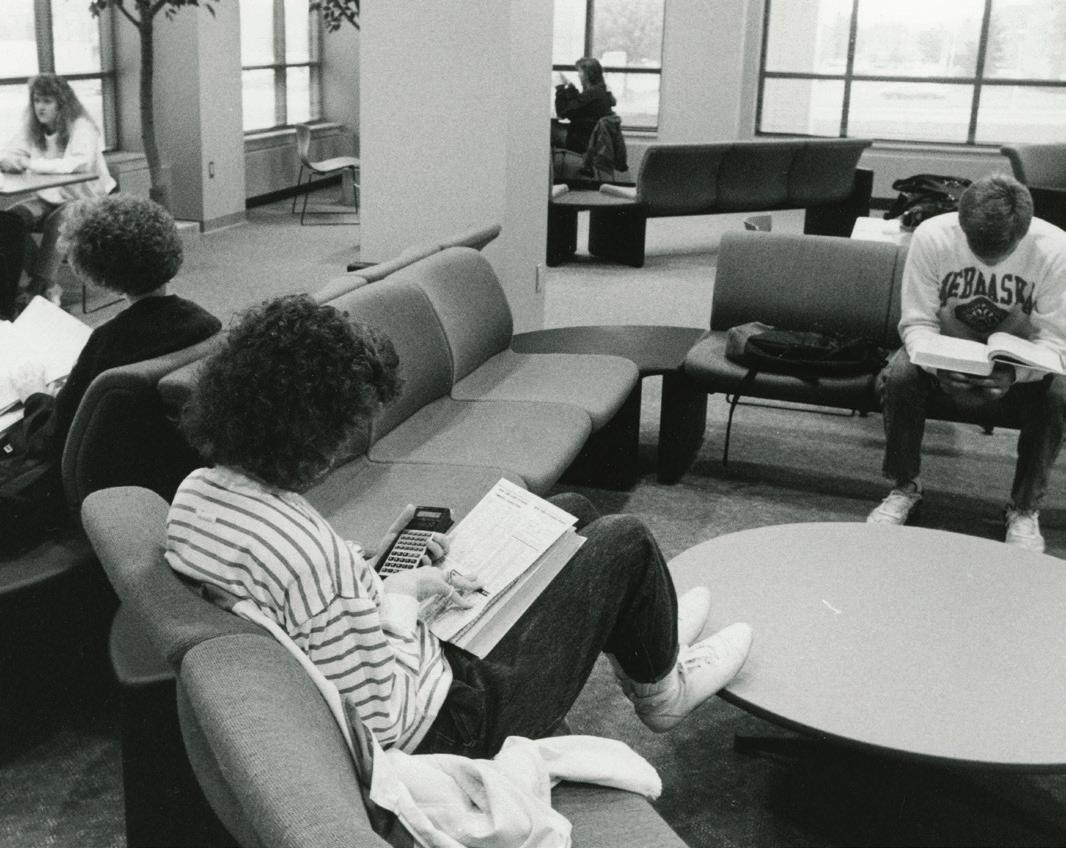
From the Commercial Department’s establishment in 1906 to the opening of the Curris Business Building in 1988, UNI has been providing top-notch business education for over a century. And we know our graduates have captured countless memories along the way.
That’s why we’re asking you, our proud alumni, to share your photos with us. Whether it’s a snapshot of you and your classmates at graduation, a candid from a student organization event, or a photo of a t-shirt with the $OB logo that you still have, we want to see it all!
We know some of these may be buried in your attic or tucked away in an old album. But we promise it will be worth the search. Not only will you be helping us preserve the rich history of business at UNI but you’ll also have a chance to reminisce about your time on campus.
We can’t wait to see what you’ve got!
We want you to share your memories, photos and memorabilia!
PURPLE & OLD GOLD AWARD
Derek Koppes Accounting
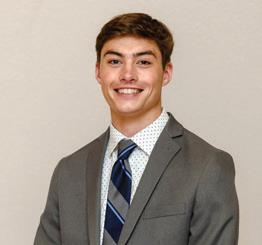

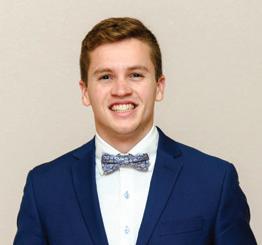

PURPLE & OLD GOLD AWARD
Sarah Garland Business Teaching
PURPLE & OLD GOLD AWARD
Emily Howke Economics
PURPLE & OLD GOLD AWARD
Logan Wolf Finance
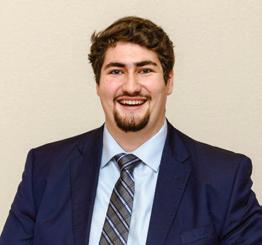
PURPLE & OLD GOLD AWARD
Kelsey Chalfant
Real Estate
PURPLE & OLD GOLD AWARD
Annika Patton Management
PURPLE & OLD GOLD AWARD
Jill Vonnahme Supply Chain Management
PURPLE & OLD GOLD AWARD
Seb Gearhart Marketing
PURPLE & OLD GOLD AWARD
Macy Hoeger Management Information Systems
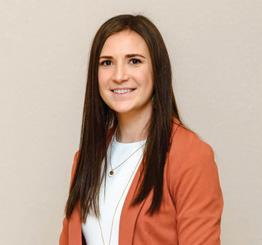
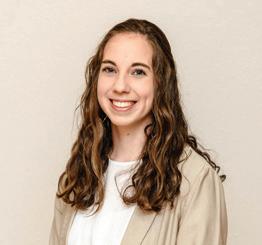
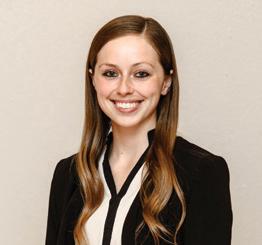
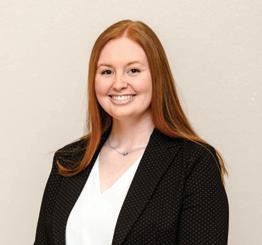
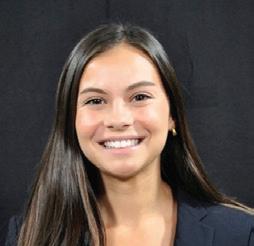
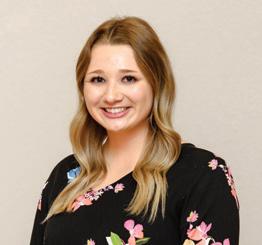
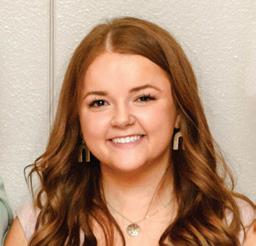
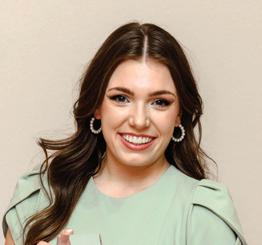

SERVANT LEADERSHIP AWARD
Andrea Echeverria
RISING LEADER AWARD
Sam Schraut
LEADERSHIP IMPACT AWARD
Derek Koppes
STUDENT ENTREPRENEUR OF THE YEAR
Aleah Vaske
MAC IMPACT STUDENT BUSINESS OF THE YEAR
Emma Slagle
Honor and Respect
STUDENT ORGANIZATION OF THE YEAR
Society for Human Resource Management
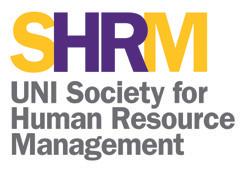
DISTINGUISHED TEACHING
Brett Olsen
DISTINGUISHED TEACHING
Ronnie Chen
DISTINGUISHED TEACHING
Ryan Flugum
DISTINGUISHED SCHOLARSHIP
Sam Matthews
DISTINGUISHED SERVICE
Amy Igou
EXCEPTIONAL IMPACT
Shahina Amin
DISTINGUISHED INSTRUCTOR
Chris Lukasiewicz
Mary Friedrich
Secretary III of the Office for Professional Distinction
K N Rajendran
Associate Professor of Marketing & Entrepreneurship

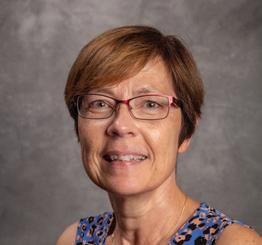

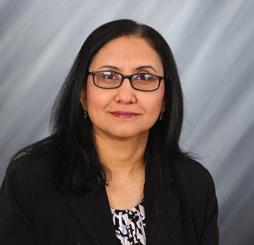
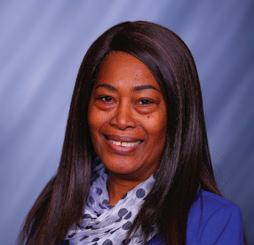

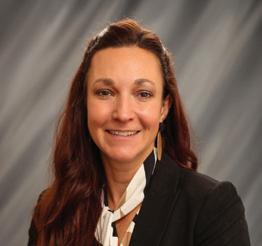
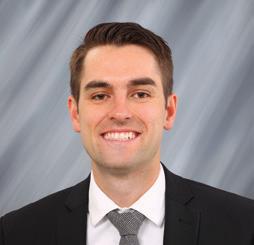
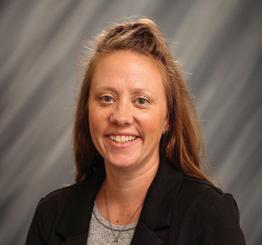
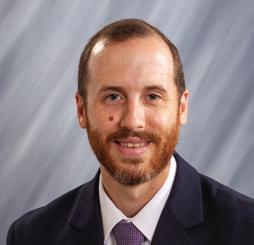
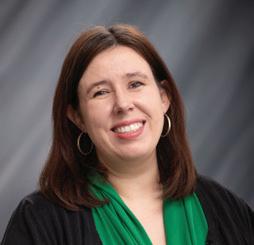
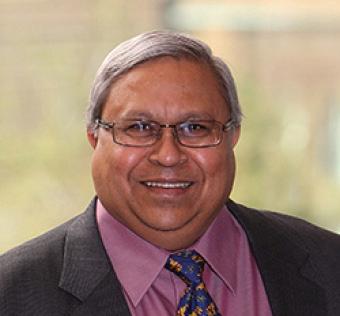


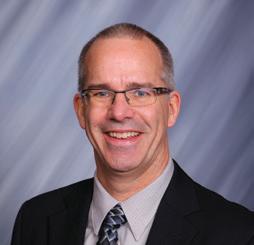
INSPIRING INNOVATION
Lindi Roelofse
ABOVE & BEYOND
Jenny Connolly
ABOVE & BEYOND
Elisabeth Soliz
ABOVE & BEYOND
Denita Gadson
ABOVE & BEYOND
Nicholas Mulholland
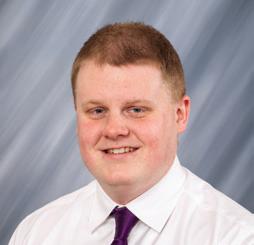
ABOVE & BEYOND
Mary Friedrich
Chris Lukasiewicz
Instructor of Economics
Mark Bauman
Professor of Accounting
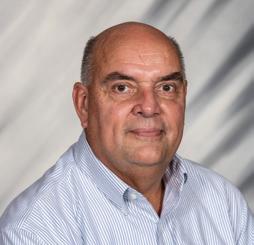
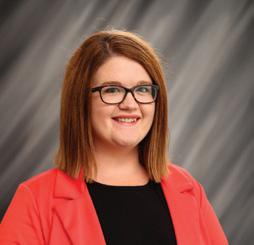
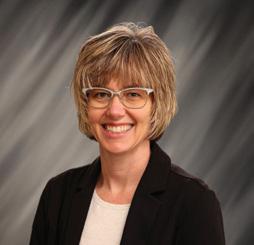
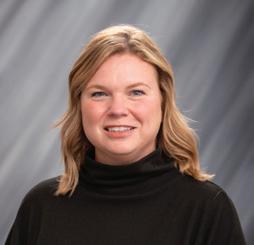
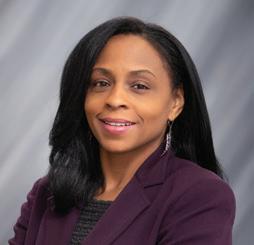

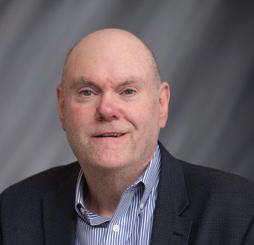
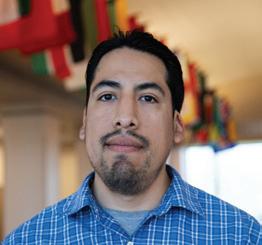
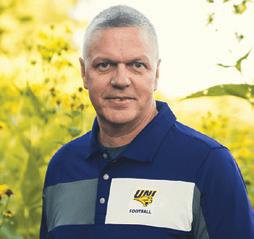
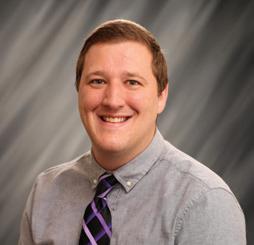
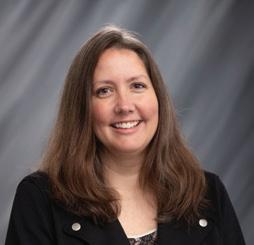
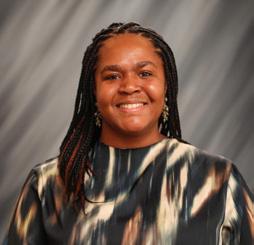
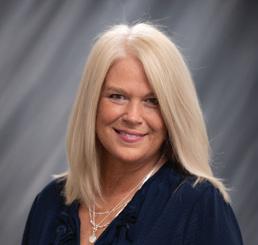
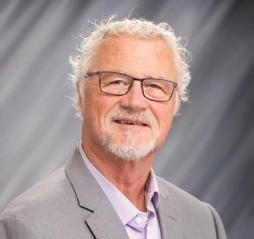
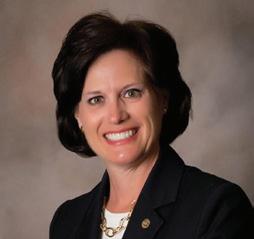
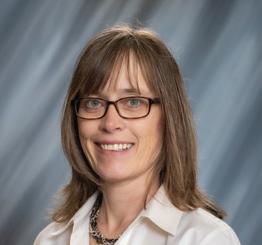
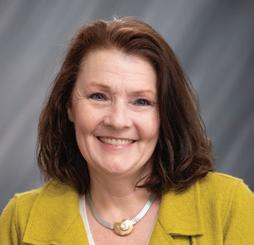
In 2026, the University of Northern Iowa will celebrate its 150th anniversary. While we certainly have taken the time to reflect on the past, this special celebration has also encouraged us to look toward the future. A common theme continues to pop up – what does the world need from UNI tomorrow? This question has prompted a number of changes on campus, including a new brand, adjusted general education curriculum and new academic programs.
This has truly been an exciting year for UNI! During Homecoming, we publicly launched the Our Tomorrow campaign announcing an ambitious goal of raising $250 million dollars by 2026, which coincides with our sesquicentennial festivities. We have already secured over $200 million through gifts and pledges, an amazing feat that was only achieved with the overwhelming support from supporters like you. This campaign focuses on four main pillars, including student access and success, engaged learning, academic programs and faculty and iconic spaces.

To all the alumni and friends who have supported UNI and the business college over the past year, thank you for your generosity and desire to impact our students. For those interested in learning more about this campaign and some of the initiatives specific to the College of Business, please contact one of us and we would be happy to provide you with more information. For nearly 150 years, UNI has educated and prepared students for successful careers around the world. Through your investment in the Our Tomorrow campaign, you help ensure we continue to prepare students to be #readyforbusiness.
Go Panthers!
Elaine Johnson Development Director Ryan Randall Development Director ryan.randall@uni.edu 800-782-9522
Ryan Randall Development Director ryan.randall@uni.edu 800-782-9522




A new scholarship will give one business student per year a four-year full-ride to UNI, including tuition, books and room & board. Marcelo Acosta, a student from East High School in Des Moines who will attend UNI in the fall, is the first recipient of the Noel Scholars program, created thanks to a generous gift by Rick (Accounting, ‘90) and Lisa Noel
Acosta found out he was this year’s recipient while at school during a surprise celebration. The scholarship was awarded by Katie Hillyer, director of the Office for Professional Distinction, and Dean Leslie Wilson. His friends and family were also in attendance, who said he was completely taken aback. But he’s grateful for the award, which will cover the cost of school beyond any financial aid he receives.
“It’s honestly relieving to know that I don’t need to worry about paying bills, or paying for textbooks,” said Acosta, who is one of four siblings. “I guess I’m more relieved that my parents don’t have to struggle to help me as well.”
Acosta has been active in high school. He participates in theater, plays center back on the school soccer team and is involved in Upward Bound, an organization that helps students from low-income families prepare for college.

At UNI, Acosta plans to do the same and get involved in any way he can. He’s already looked into several leadership programs and plans to major in business
management. Because of his own experiences, Acosta’s career goal is to help low-income citizens find housing.
“When I was a child, we had that struggle financially,” Acosta said. “We honestly had to get a lot of help just to make it where we are now. That struggle, those experiences that I’ve had, kind of motivated me to help other people that have the same struggles. That’s why I want to go into business so I can help other families.”
Hillyer was one of the staff members who interviewed Acosta for the scholarship. She was struck by Acosta’s passion for wanting to give back.
“He’s an amazing young man, and I think he’s taken full advantage of the opportunities in his high school career,” Hillyer said. “It means a lot to be able to make a difference like that in someone’s life.”
Acosta was initially drawn to UNI because of its quality business and study abroad programs. The people he met on his campus tours reminded him of the friendliness at home. So he applied, was accepted and started turning in scholarship applications, which tipped him off to the Noel Scholars program.
“UNI was wholesome, and I didn’t get that feeling at other colleges,” Acosta said. “I knew this was a new home to me. And the business program is amazing.”

“UNI was wholesome, and I didn’t get that feeling at other colleges.”

The first named faculty fellowship in the Department of Marketing & Entrepreneurship was fully funded and will serve as a lasting reminder of one of the most celebrated professors and mentors at UNI’s College of Business.
The Steven B. Corbin Endowed Fellowship in Professional Sales will support a faculty member who dedicates their time to the
department’s professional selling program and builds on Steve Corbin’s 37-year legacy as professor and head of UNI’s marketing department.


Funding was secured from friends and former students of Corbin using crowdsourcing. More than $60,000 was raised in support of the fellowship, far surpassing the stretch goal of $37,000. About 91% of that
money was donated from alumni across 15 states.
“I am really, really thrilled,” said Martin Hansen, a longtime friend of Corbin and current instructor of marketing and entrepreneurship who serves as the head of the Center for Professional Sales Excellence. “There are a ton of things that I see this fellowship can help the school accomplish, really
 Steve Corbin’s last university headshot before retiring in 2013.
Steve Corbin’s last university headshot before retiring in 2013.
helping us become a jewel when it comes to sales education and helping people.” One main focus of the fellowship is building out the Center for Professional Sales Excellence, a dedicated sales program at UNI that offers premier education for students, faculty and community members throughout the Midwest. The center is located in the Business and Community Services
Building and features stateof-the-art training classrooms with video and audio recording capabilities. Additional fundraising will go toward making the fellowship a professorship, which will provide additional sales center resources and further honor Corbin’s legacy.


“This really is the kickoff for that center,” said Dale Cyphert, head of marketing and entrepreneurship and one of the leaders for the fellowship fundraising campaign. “We’re excited to have this support so we can expand the reach of this program. This fundraising effort is a very successful example of what we can do as a university community. One person could never have done this alone.”
Hansen added: “This is a dedicated resource. We’re really go -
ing to focus on the tools that are necessary to teach our students and community members to be effective, ethical salespeople. The great thing about the sales center is it’s really an opportunity for a much broader audience than most people could imagine.”
Corbin is remembered fondly by students and faculty members alike. Throughout his 37-year career, he was known for his excellence in teaching, scholarship and service contributions, and dedication to students and UNI. He retired in 2013 but is still passionate about giving back and helping students. This fellowship will ensure his work lives on in the college.

“We’re excited to have this support so we can expand the reach of this program. This fundraising effort is a very successful example of what we can do as a university community.”Steve Corbin is widely recognized and remembered for his excellence in teaching, scholarship and service contributions in addition to his dedication to his students and to the university. Steve Corbin teaching in the ‘Old’ Reading Room located in Seerley Hall.

78% 8% 5% 1% 8%
Student Professional Development
Example: 100+ travel abroad scholarships
Faculty Development & Support
Example: Professional development seminars
Alumni Relations
Example: Executive-in-residence events
Academic Partner Relations
Example: Partnership meetings in China and Europe
Corporate/Community Relations
Example: Power of the Purse sponsorship
We recognize those who have made the Dean’s Fund for Excellence a focus of their giving with a donation of $1,000 or more during the 2021-22 academic year. As seen above, this unrestricted fund primarily supports business students who invest time and effort in building a professional edge that will be of immediate, marketable value upon graduation.
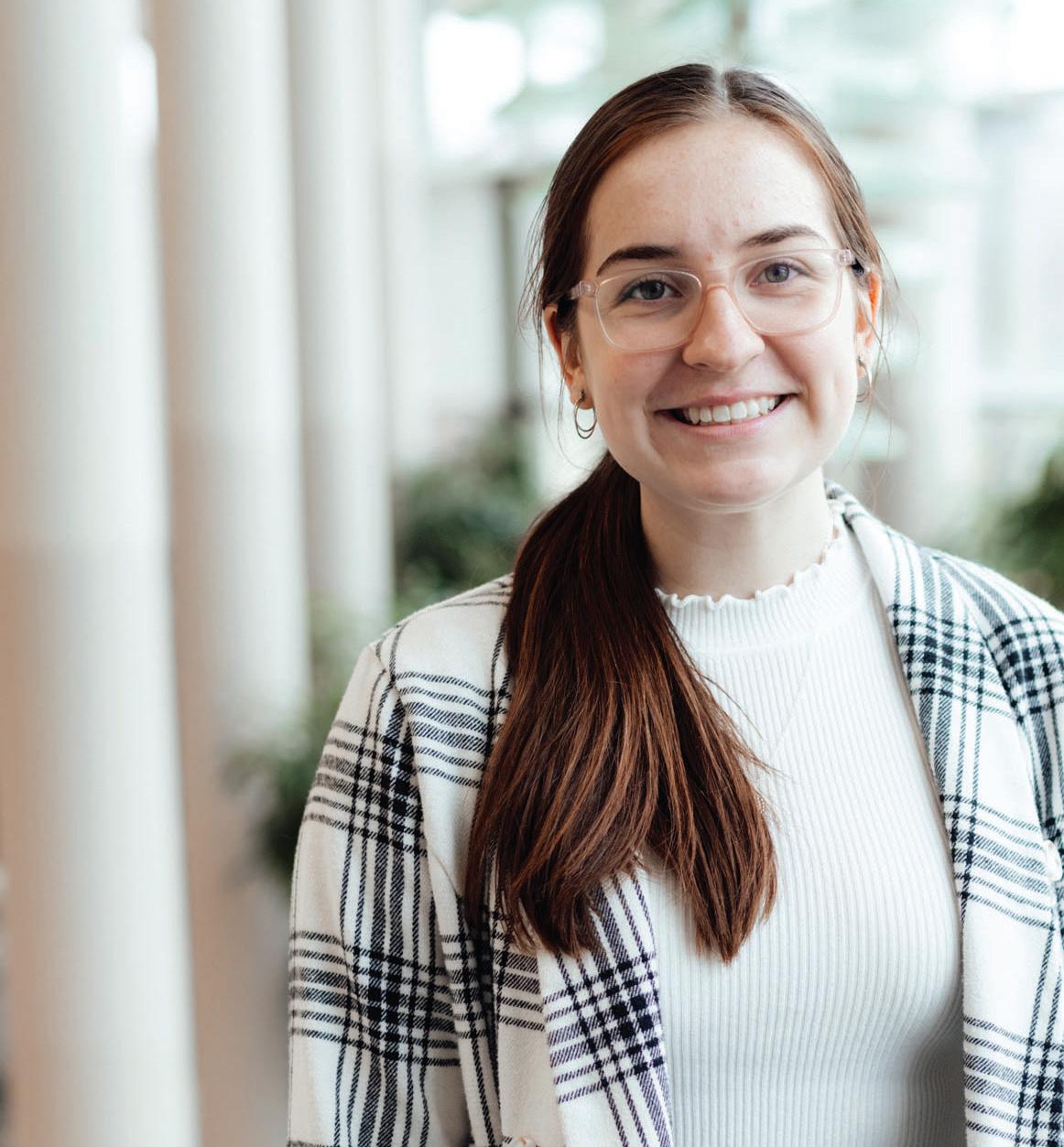
Leadership Cabinet $10,000+
David & Cynthia Petratis
United Fire Group
David & Holly Wilson
Chad & Rebecca Meyer
Leadership Circle $1000-$4999
Darla Brendemuehl & Sarah Tracy
Mike & Kathryn Brimeyer
Cuna Mutual Group Foundation
Dan & Pat Fliger
Scott & Mary Ellen Hassenstab
Anthony & Julianne Howard
IBM Corporation
Matthew & Dana Kinley
Daniel P. Kunkel
Jared C Larson
Leanne Lind Marden
Tony & Luann McAdams
Nexus Solutions LLC
Dennis Padget
Sheldon & Donita Petersen
Andrew & Carrie Roquet
Steven & Trina Schonert
Jeff Scudder
Leadership Team $5000+
David & Jeanne Allbaugh
Laura Huisman
Denny & Tama Mullen
Heidi B. Shuraleff
Randy Ingram & Kathy Tanner Ingram
Pamela & Jim Taylor
Benjamin & Jennifer Miller
Dustin Toale
Steven B Oberhauser
Jill & Nicholas Hittner
Joyce Moser
Fallon & Chris Savage
James Usgaard & Becky Knutson
Scott & Angela Horton
Equifax Inc
Gary & Patsy Roling
Deena Sigel
Robert Sloan
Leslie & Logan Wilson
David & Joan Zrostlik
AEGON/Transamerica Foundation
3M-Minnesota Mining & Mfg Fdn. Inc.
AEGON/Transamerica Foundation
Amcor Foundation
American International Group
Baird Foundation, Inc.
Bank of America Matching Gift Program
BankIowa Employee Matching Gift Program
Bayer
Berkshire Hathaway Energy Company
Best Buy Company, Inc.
FORVIS
Carl and Eloise Pohlad Family Foundation
Caterpillar Foundation
Charles Schwab
Cuna Mutual Group Foundation
Deloitte Foundation
EideBailly
Equifax Inc.
Ernst & Young Foundation
Farm Credit Services of America
FBL Financial Group, Inc.
Fifth Third Bank
General Mills Foundation
Hormel Foods Corporation
IBM Corporation
John Deere Foundation
KPMG Foundation
Life Care Services Corporation
Merck Company Foundation (The)
Nationwide Insurance Foundation
Nexus Solutions LLC

Northwestern Mutual Foundation
Nutrien
PricewaterhouseCoopers Foundation
Principal Financial Group Foundation, Inc.
Prudential Foundation
Raytheon Technologies
Union Pacific Corporation
United Fire Group
U.S. Bancorp Foundation
Veridian Credit Union
Verizon Foundation
The following companies matched their employees’ gifts to the business college: Thank you.
Wellmark Blue Cross and Blue Shield
Wells Fargo Foundation
UNI thanks all Dean’s Fund for Excellence donors for their commitment to business student success.
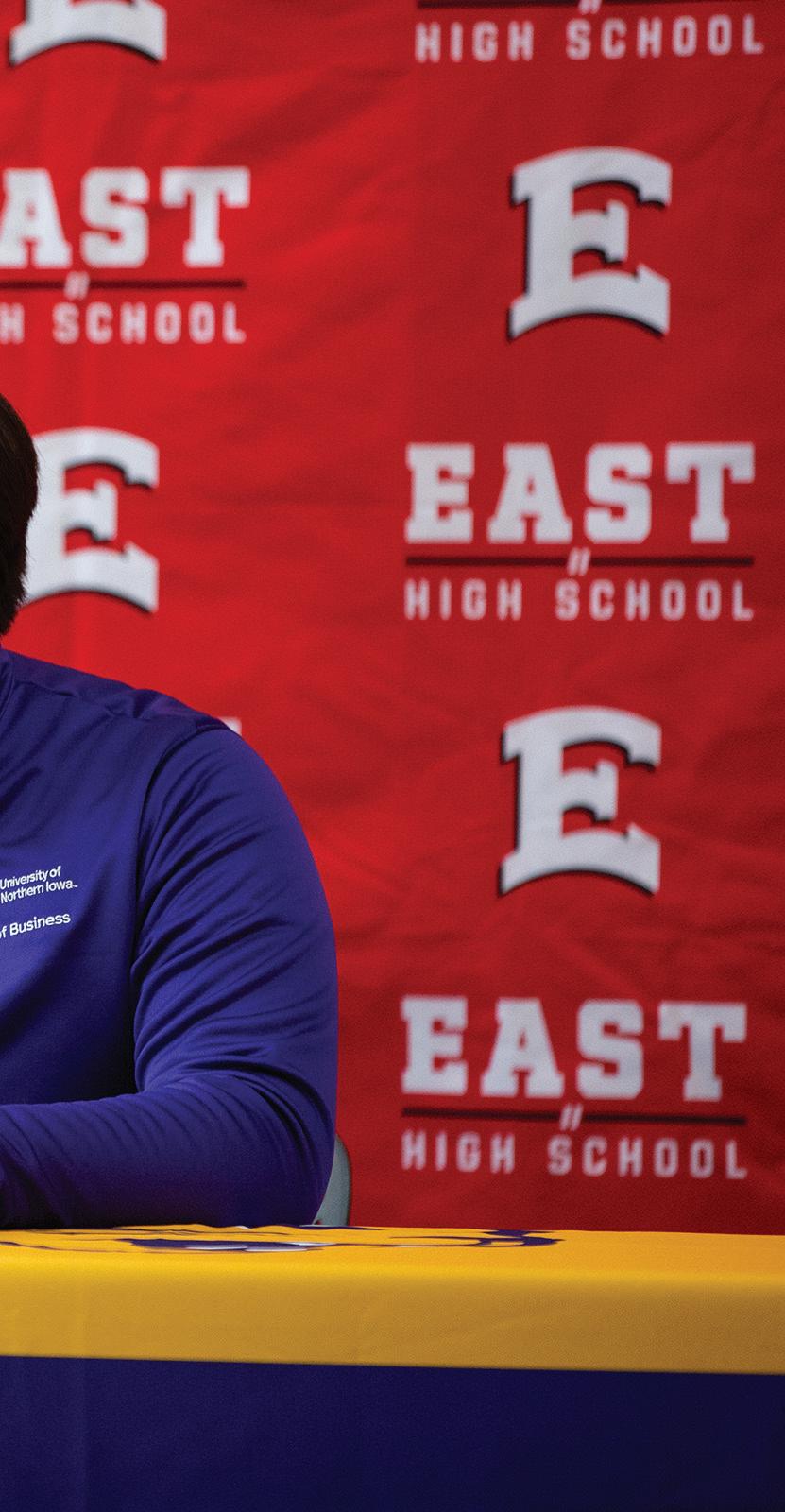
We talk a lot about getting our students “Ready for Business,” but what does that really mean for you? “Ready for Business” is our promise for the future. Everyone’s future. We will turn students into professionals.
/ They will become effective leaders.
/ They will create jobs.
/ They will increase the financial stability of Iowa.
Gifts to the Dean’s Fund for Excellence financially support certification classes and professional development programs, international studies, student competitions, site visits and other career-specific learning opportunities.
We deeply appreciate the loyal support from the Dean’s Leadership Society. Activities made possible by these generous investments provide the foundation for students to become the leaders of tomorrow.


